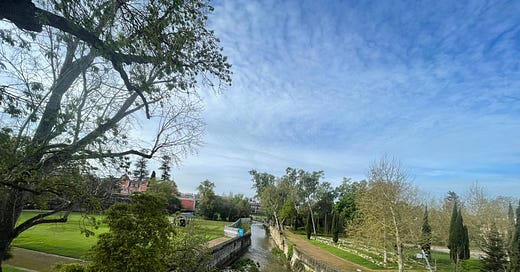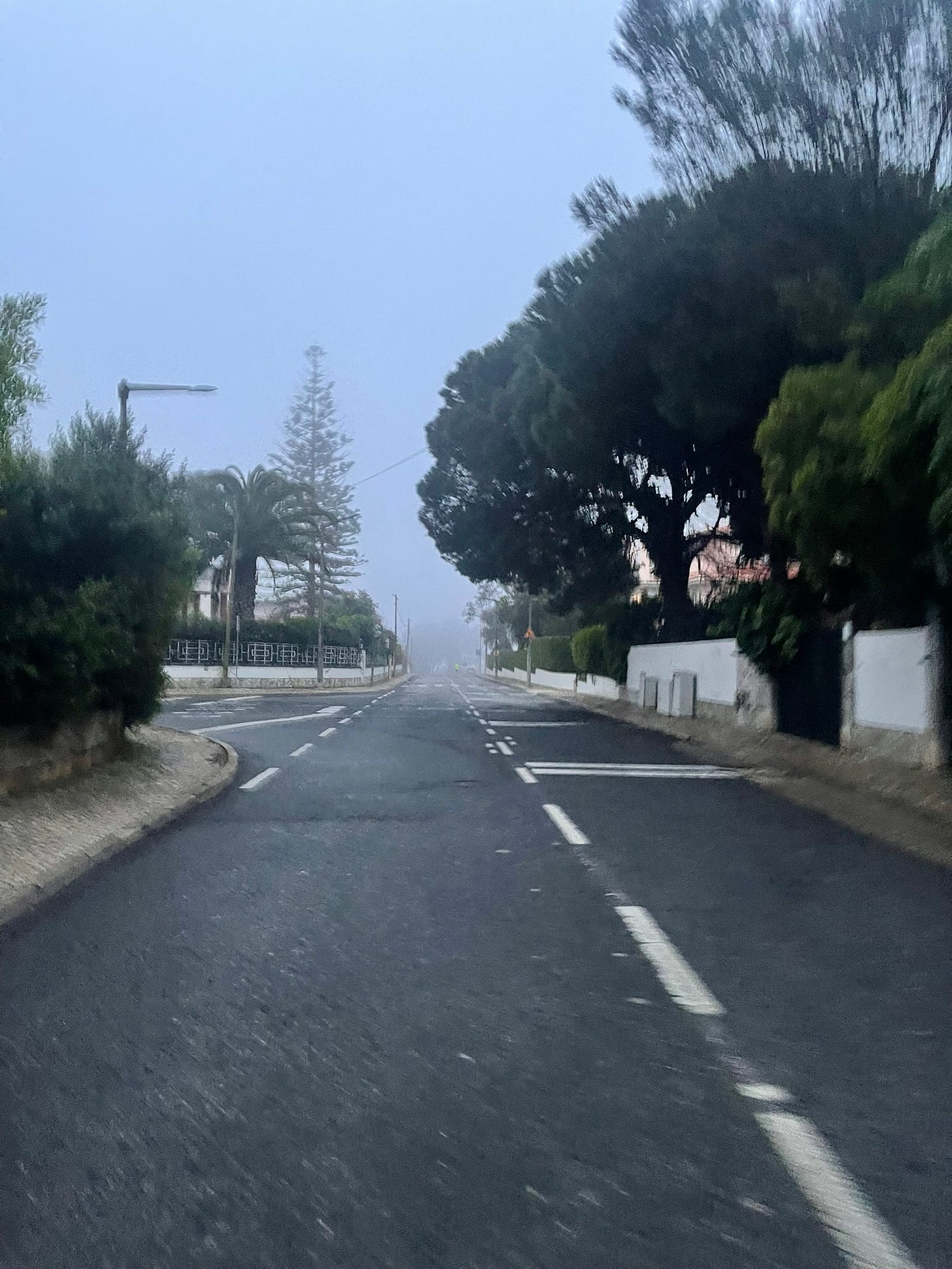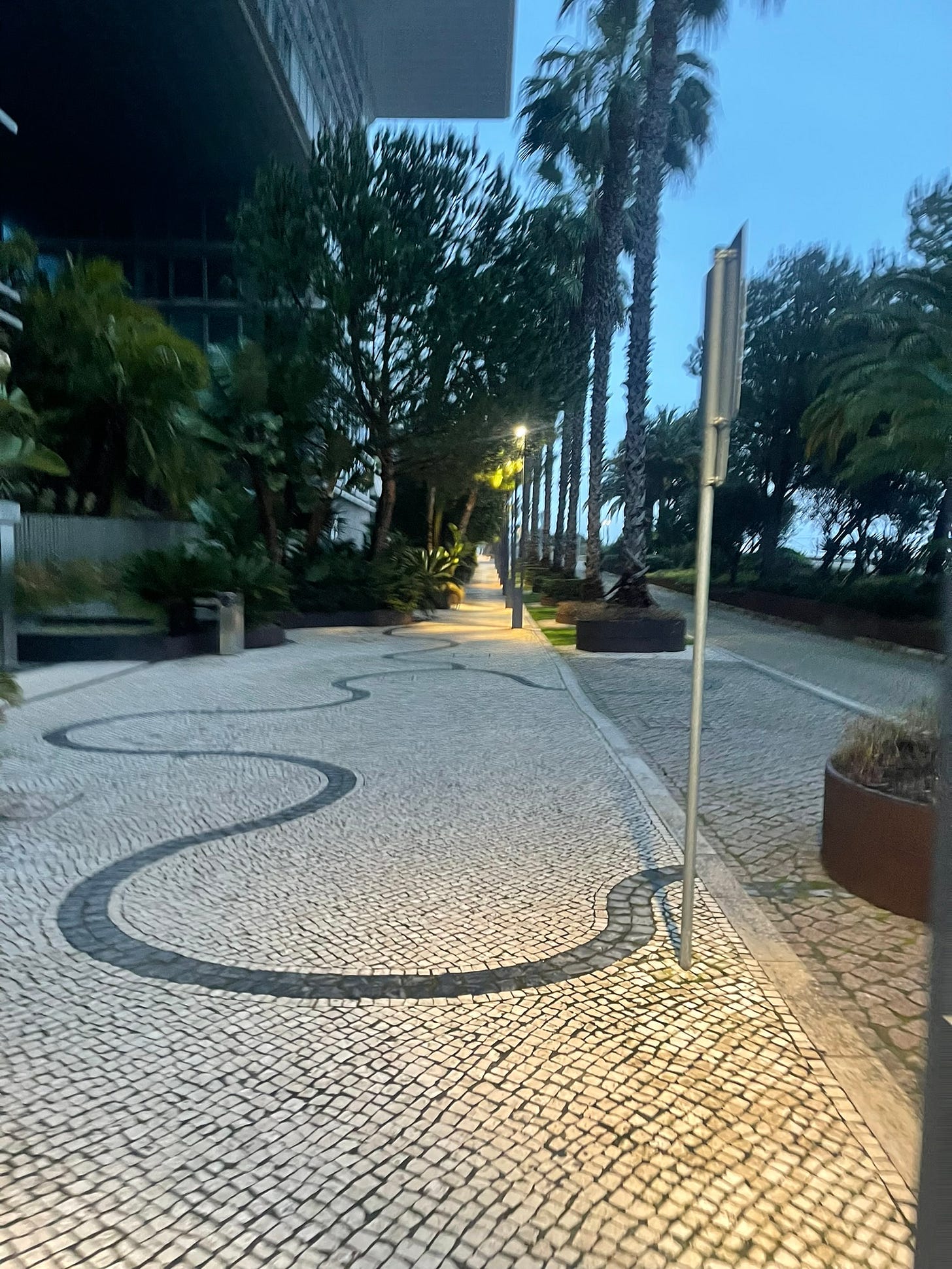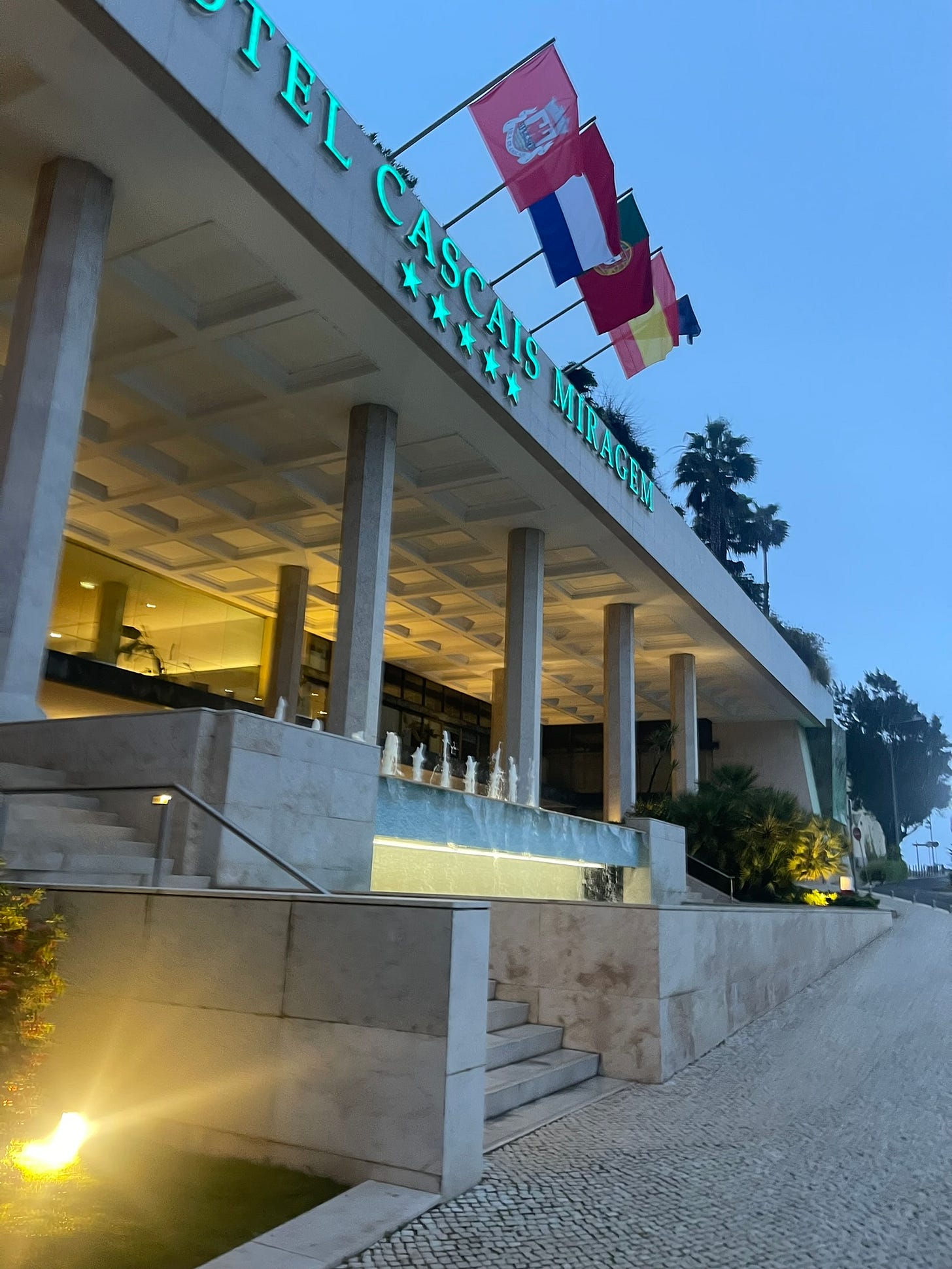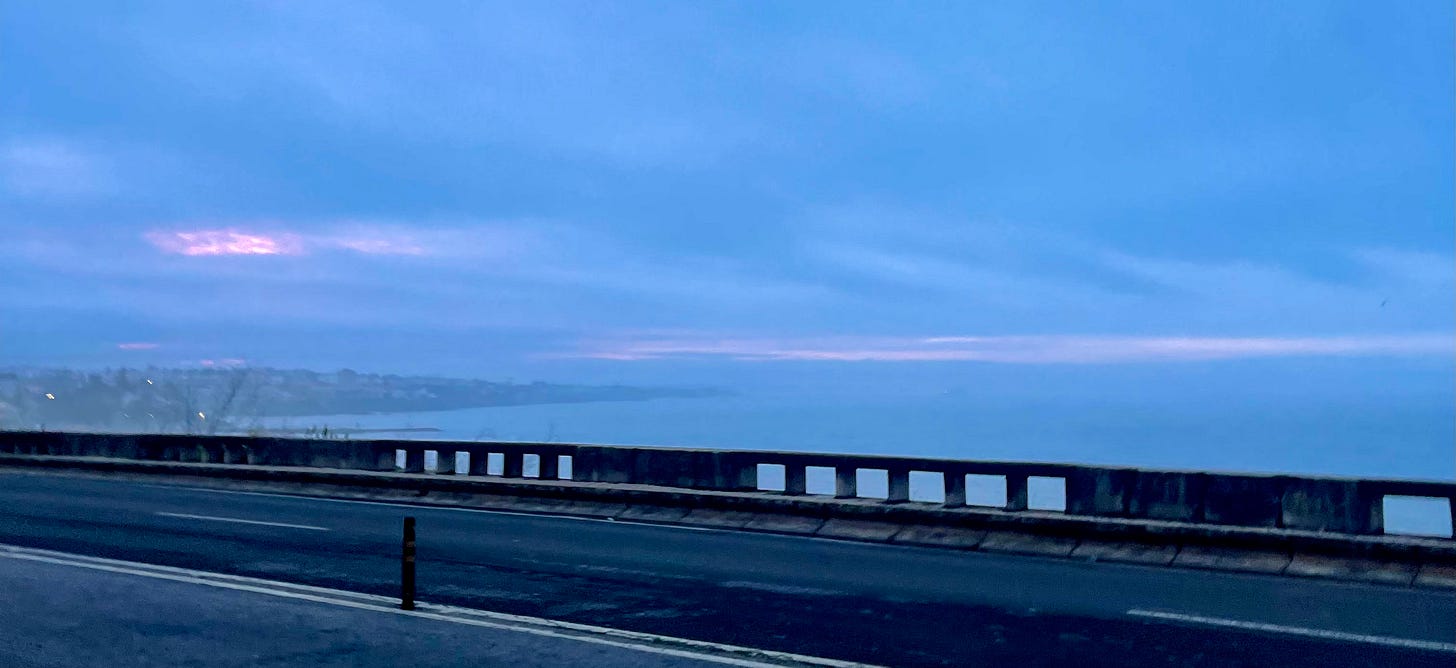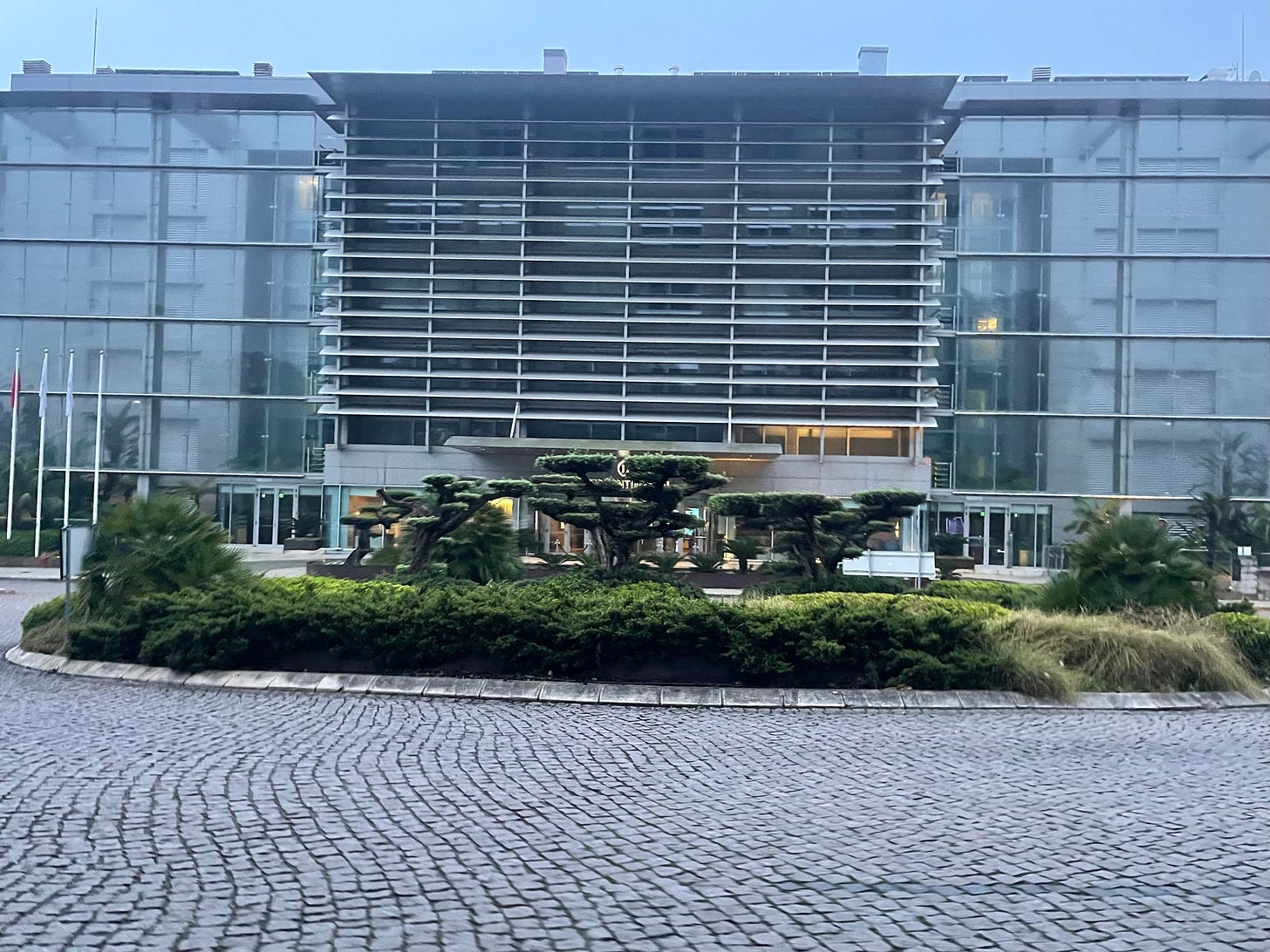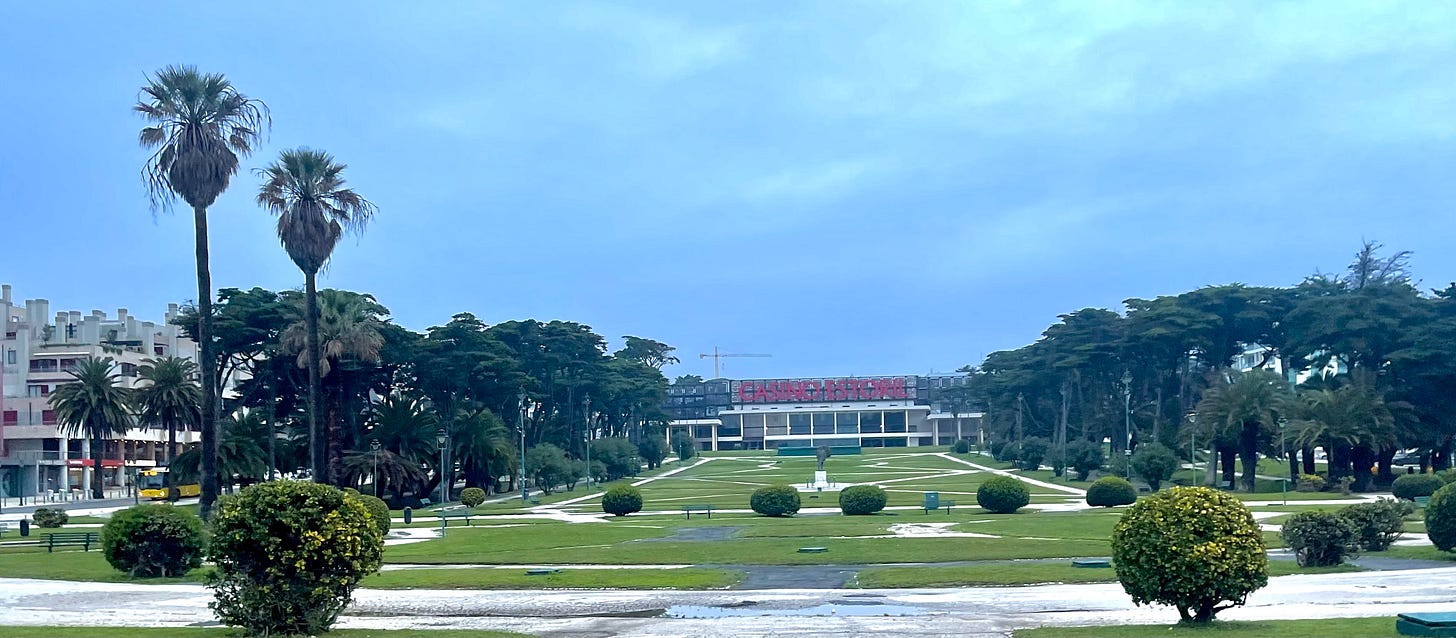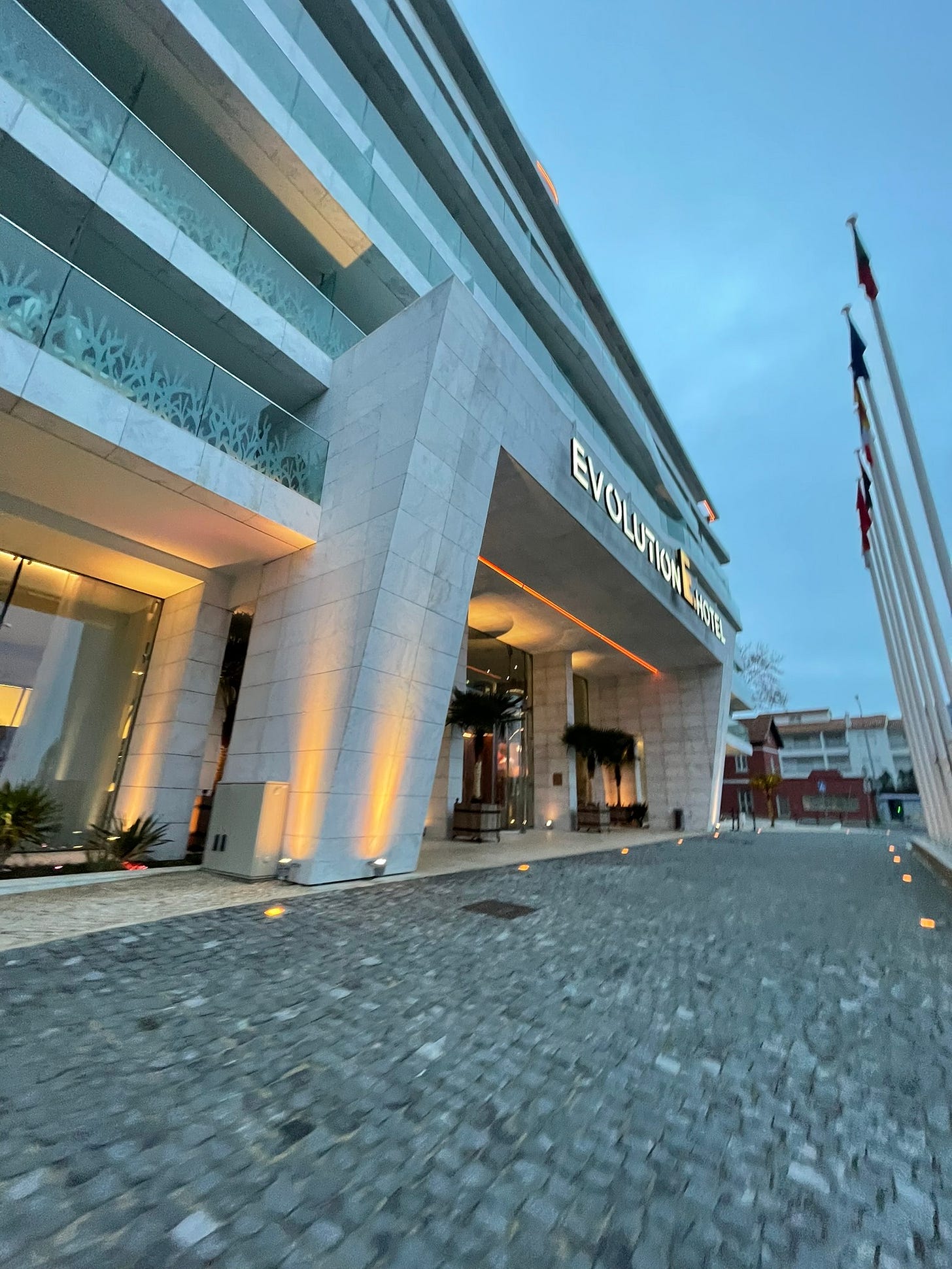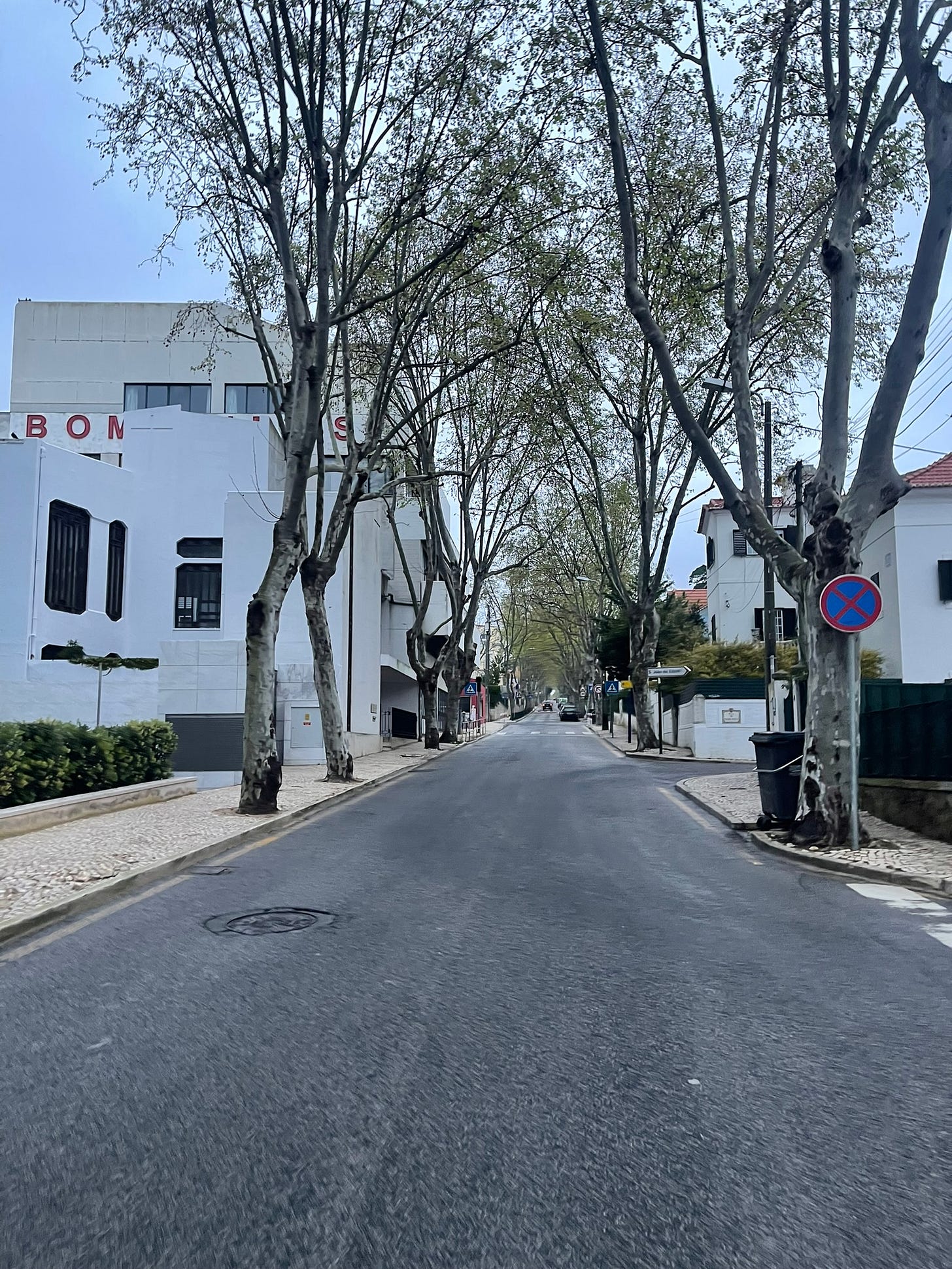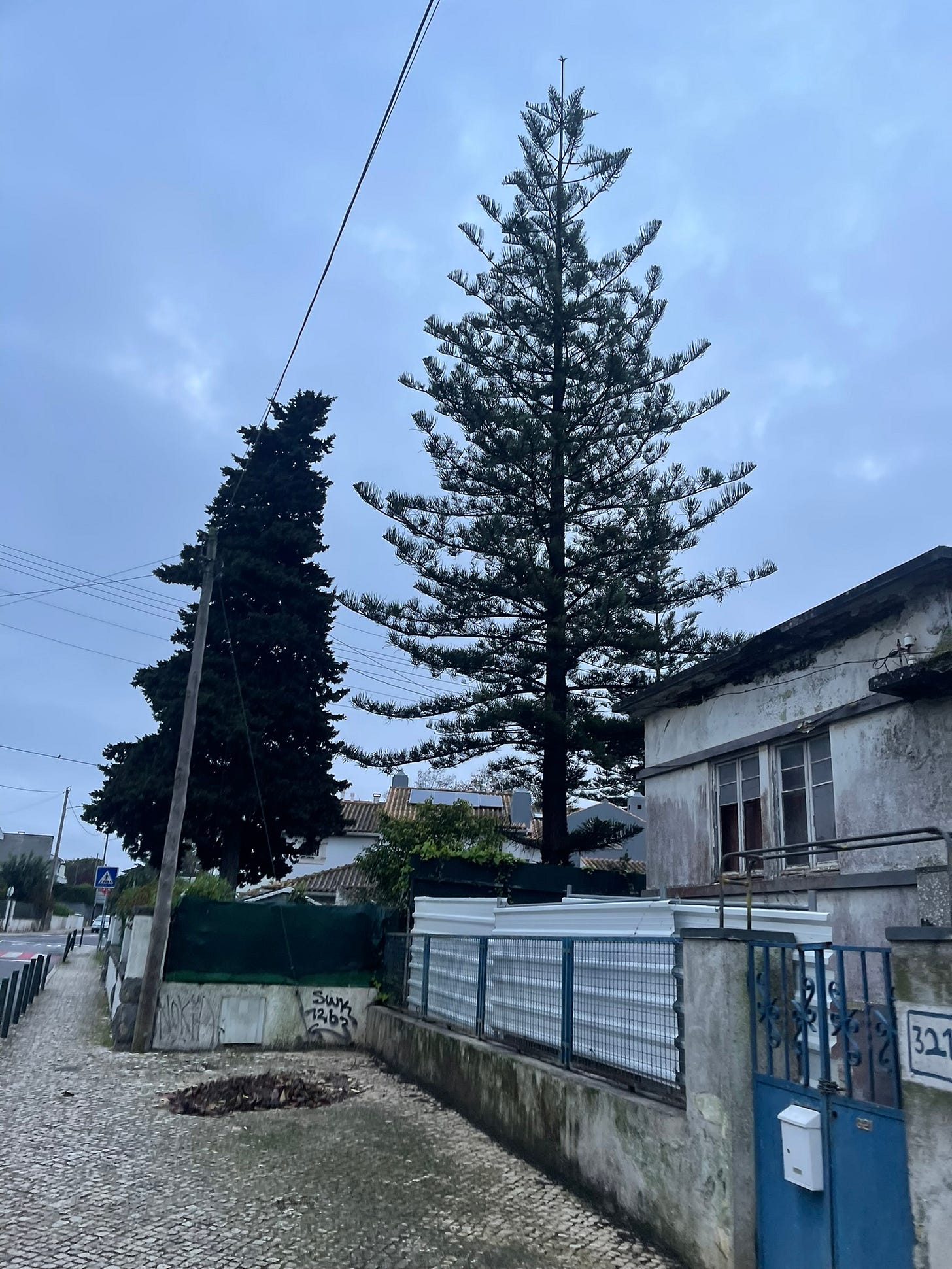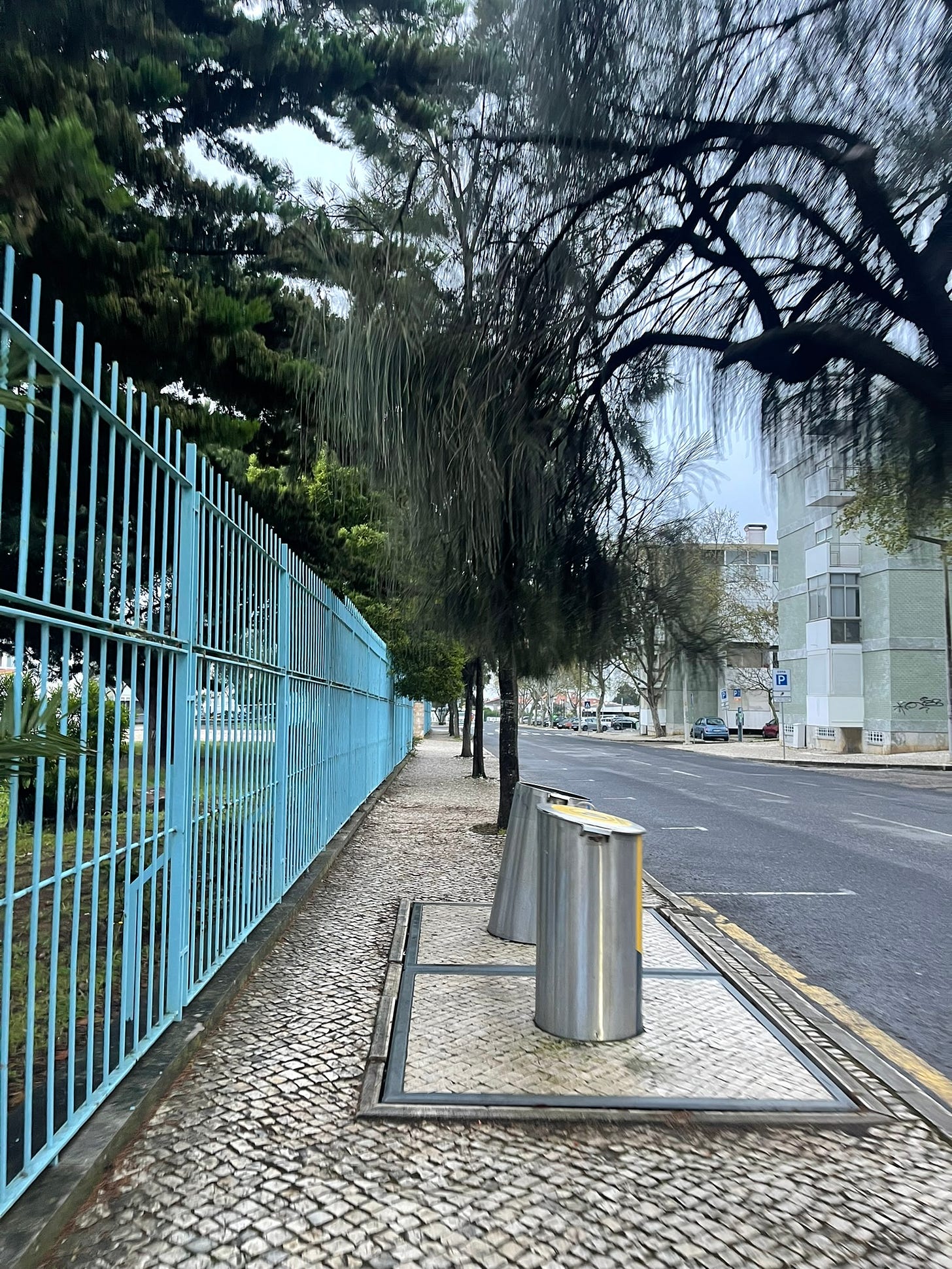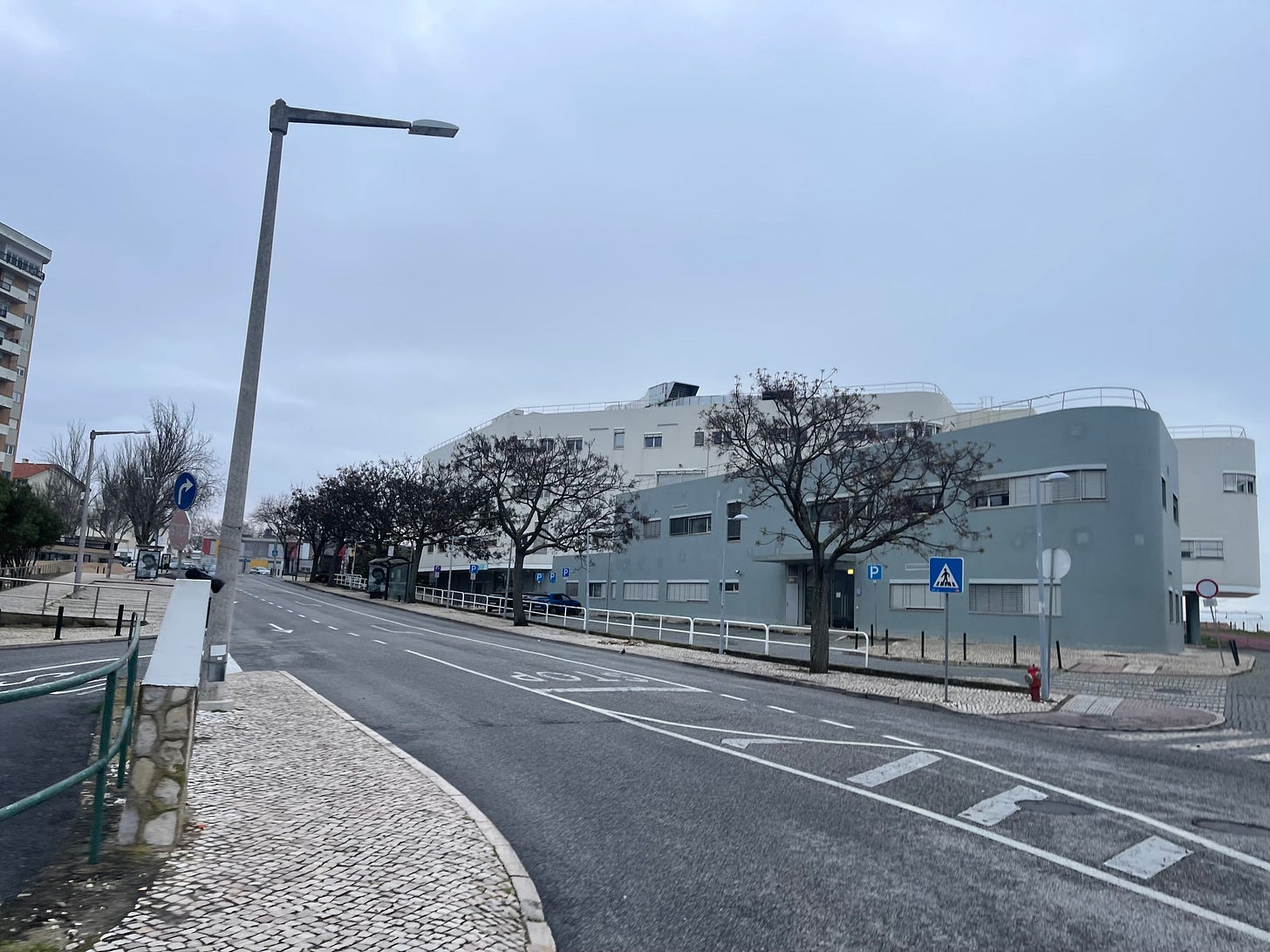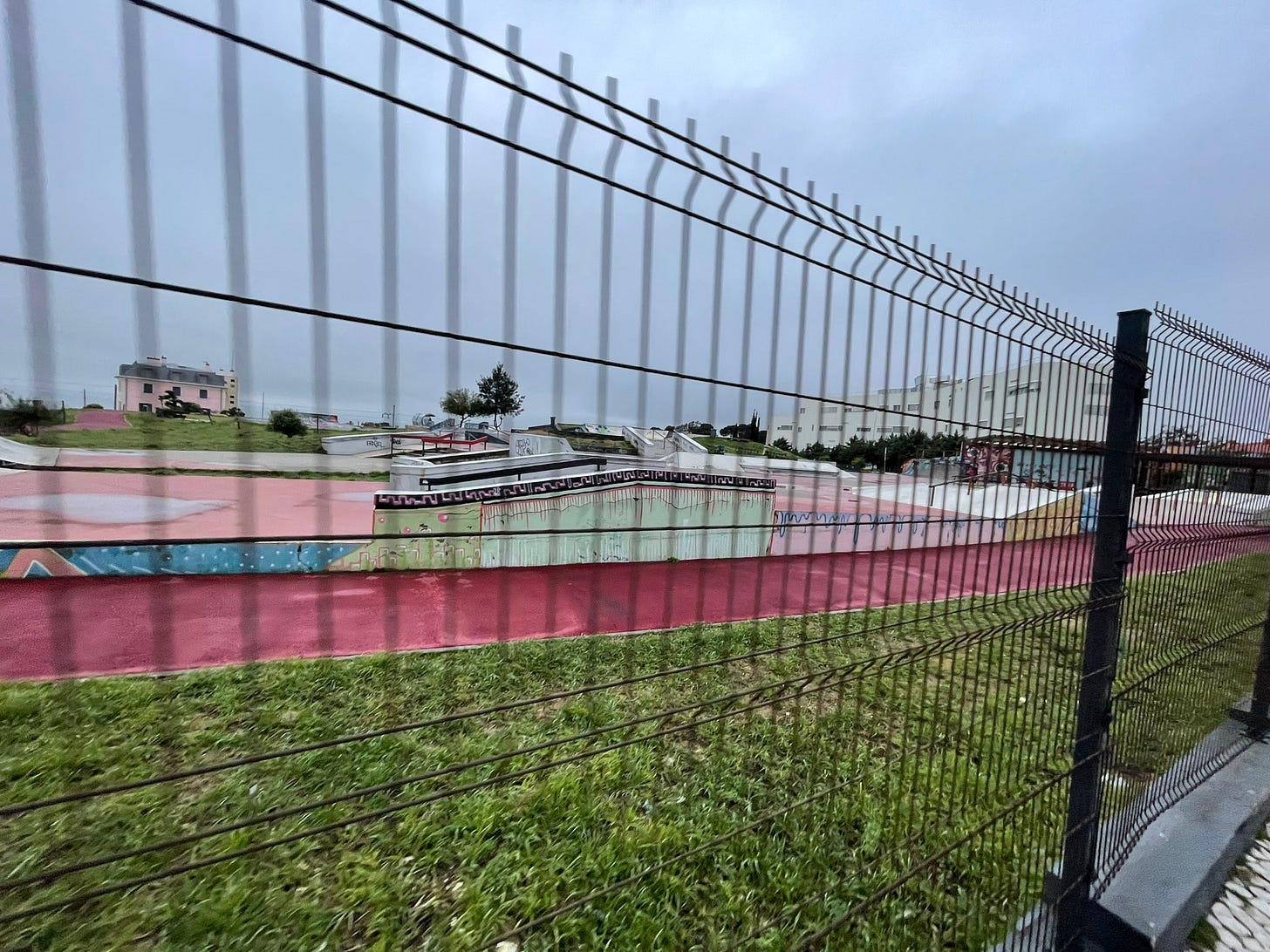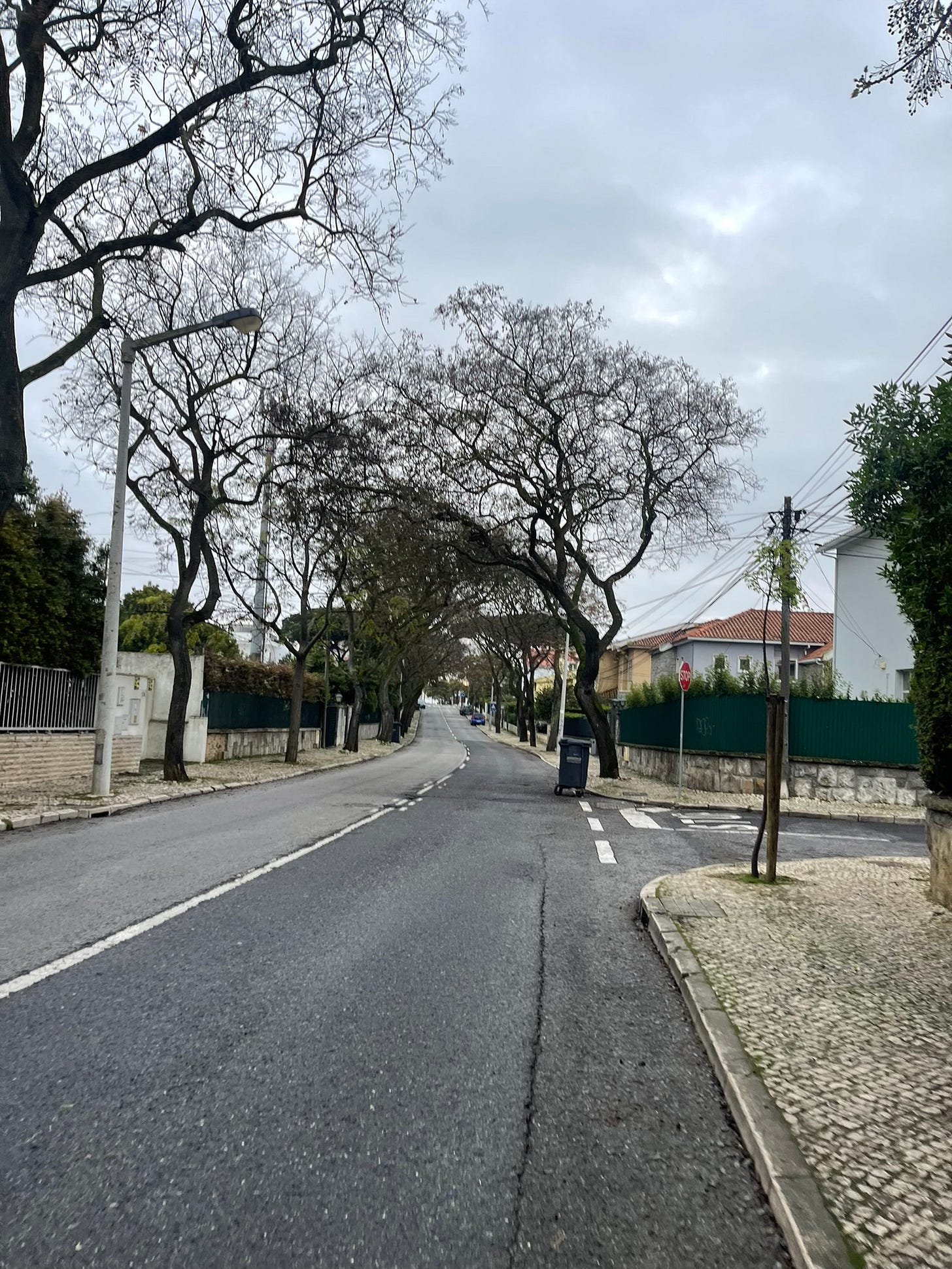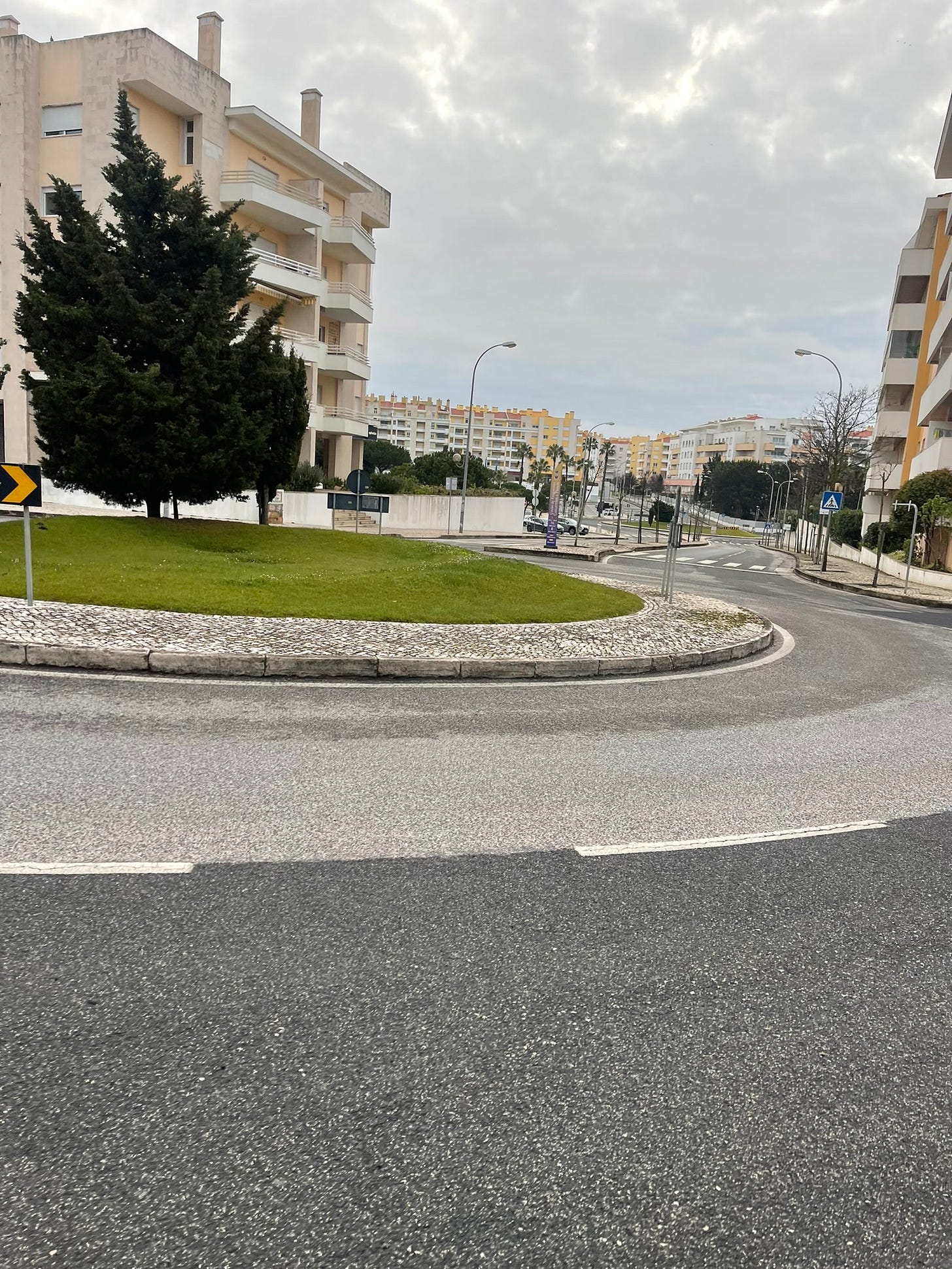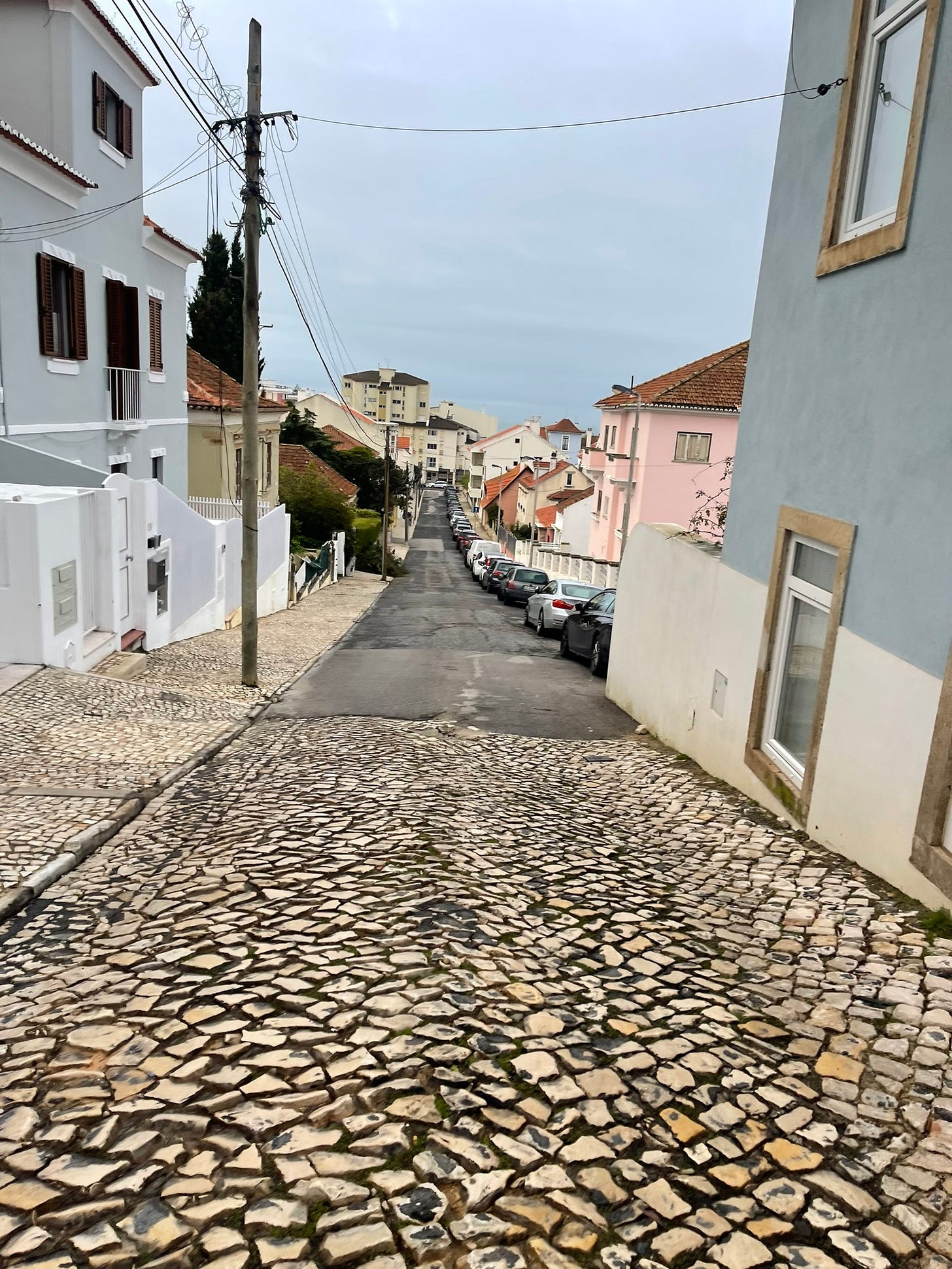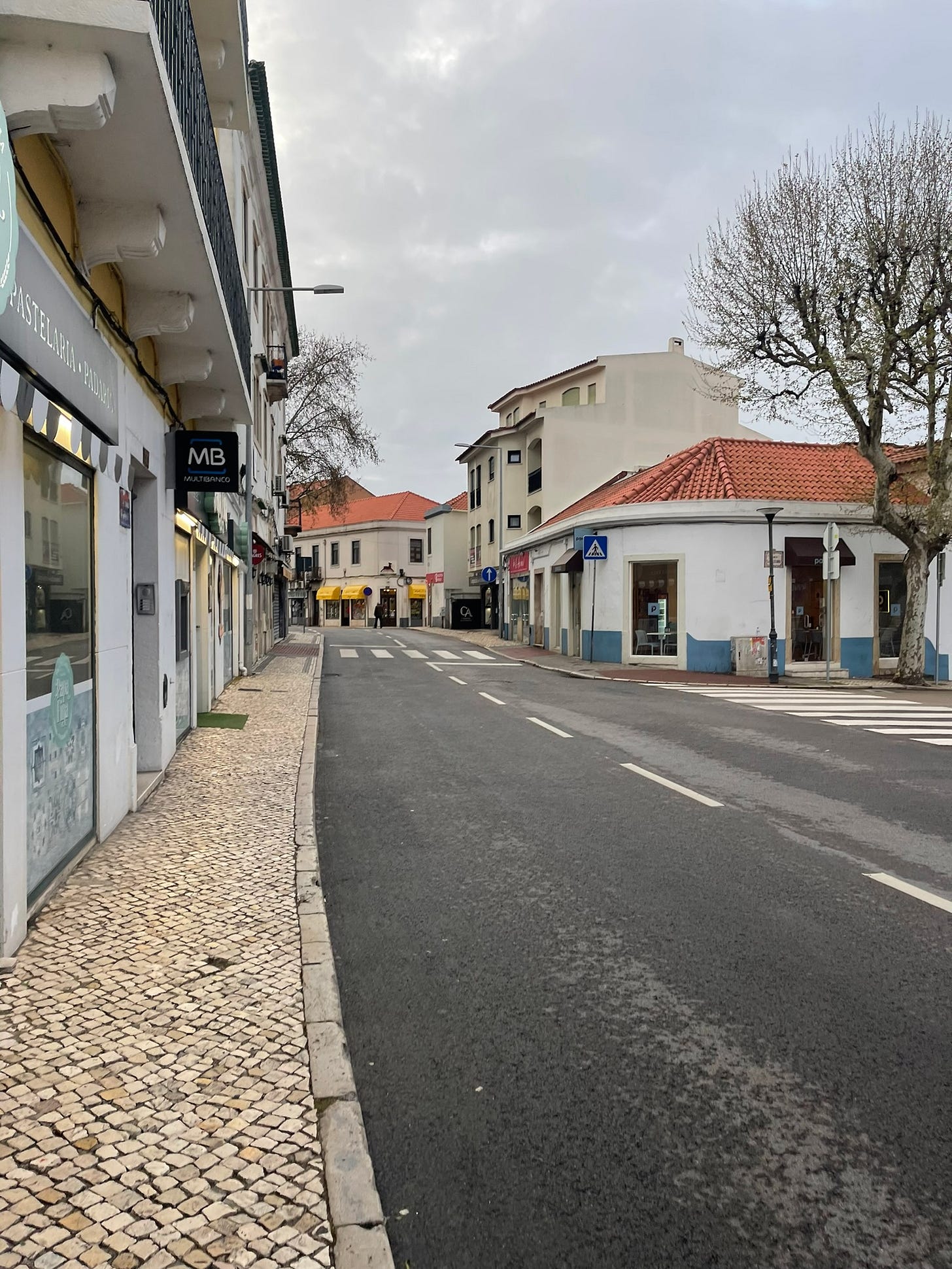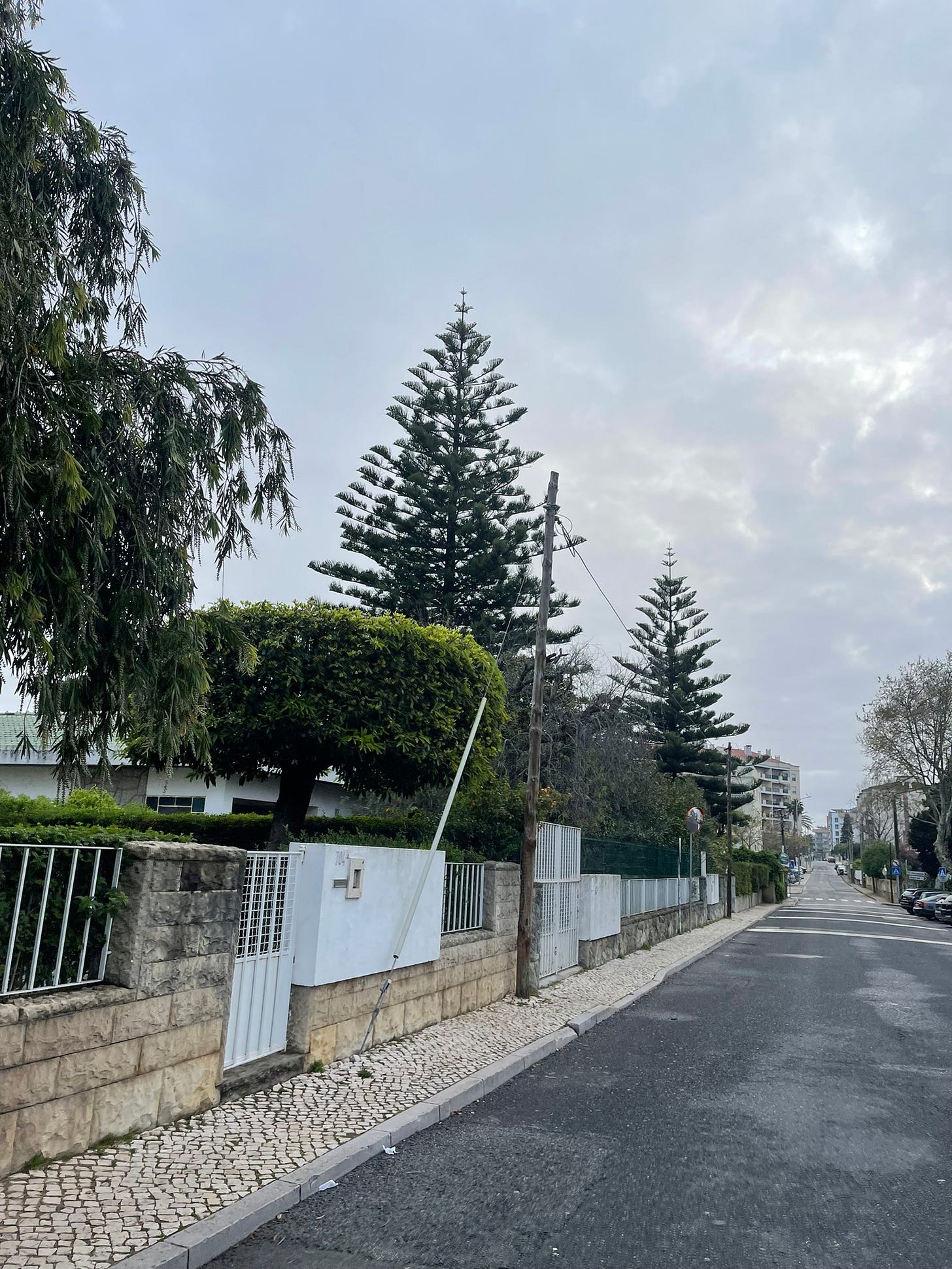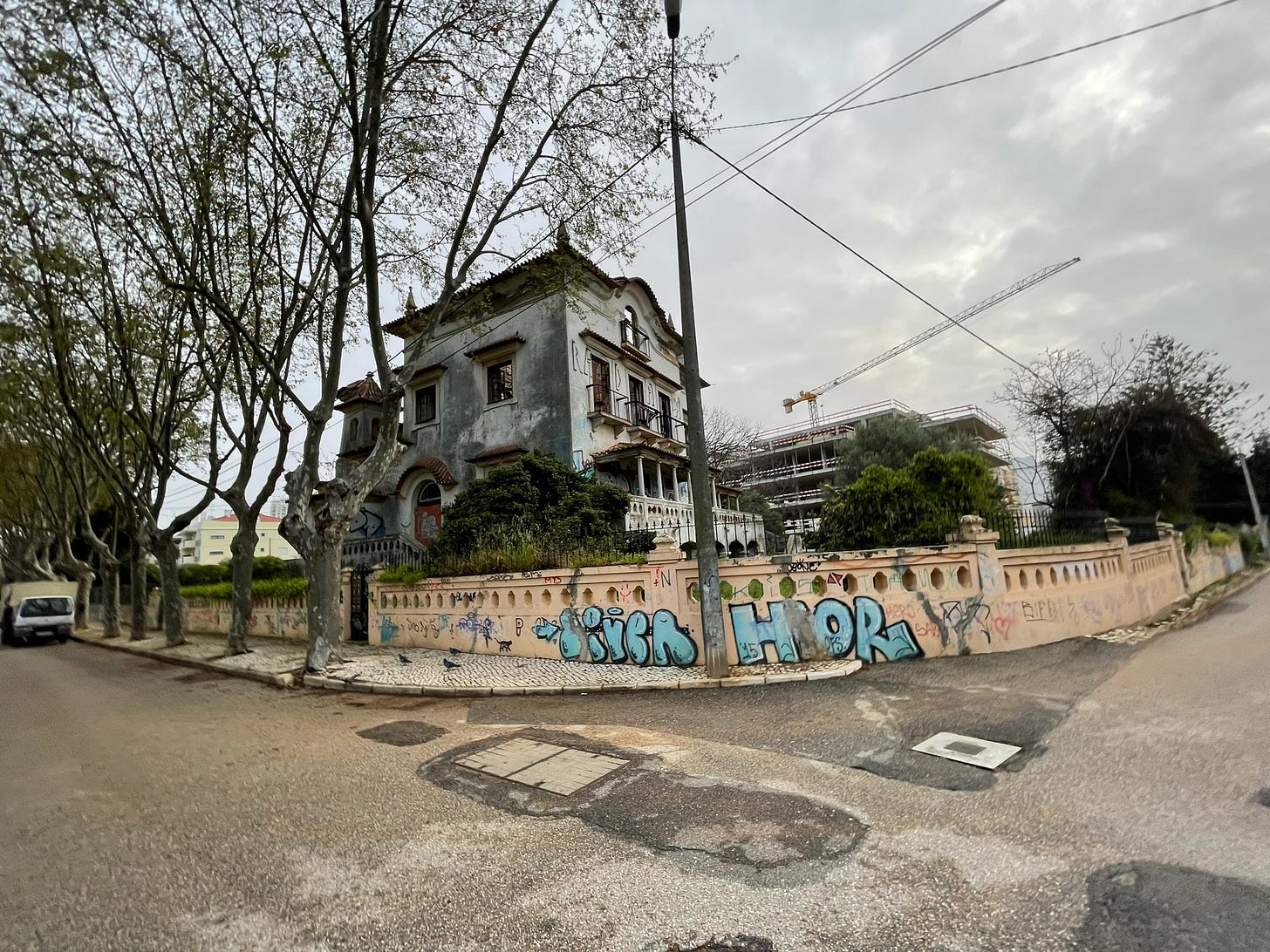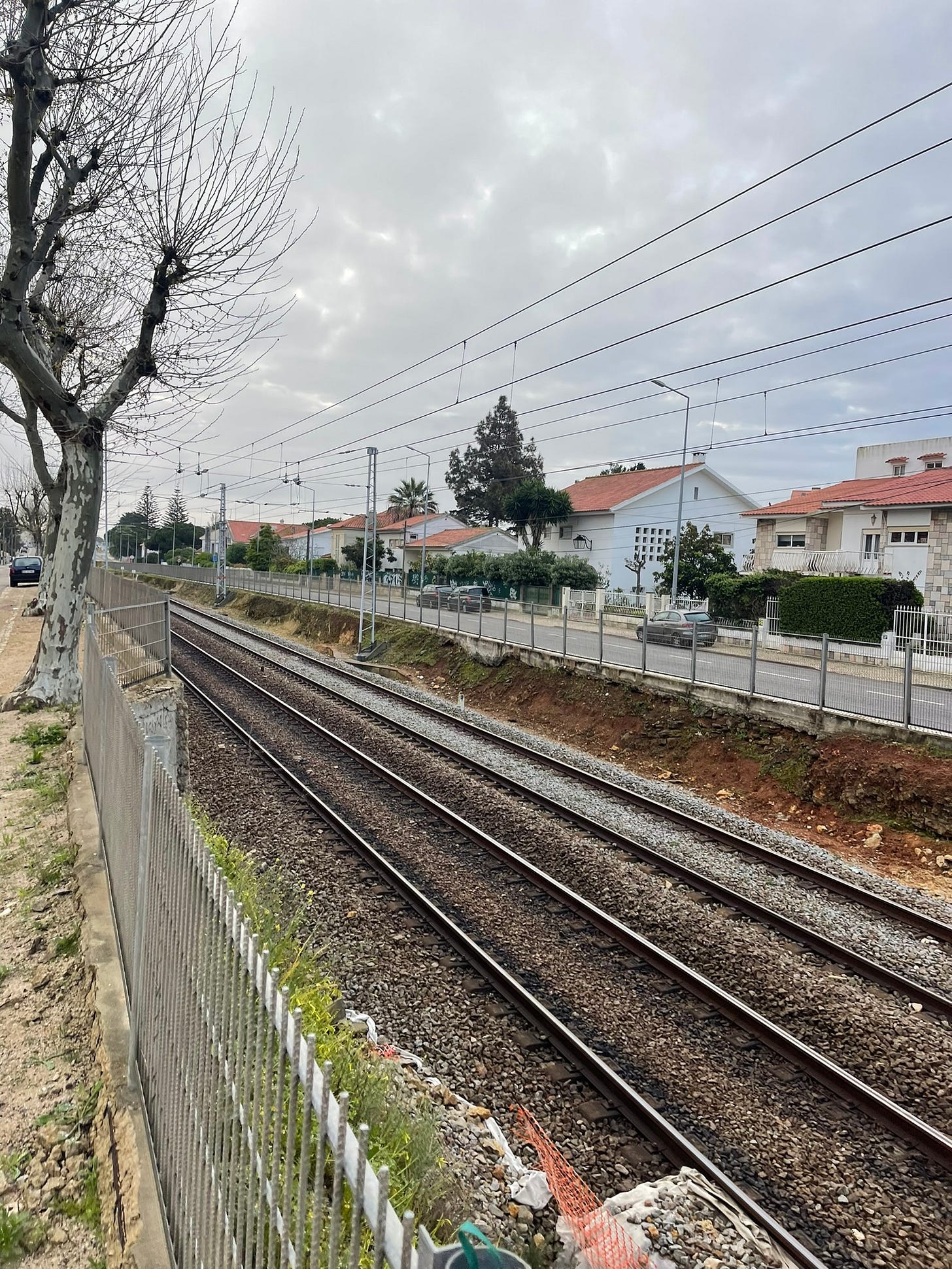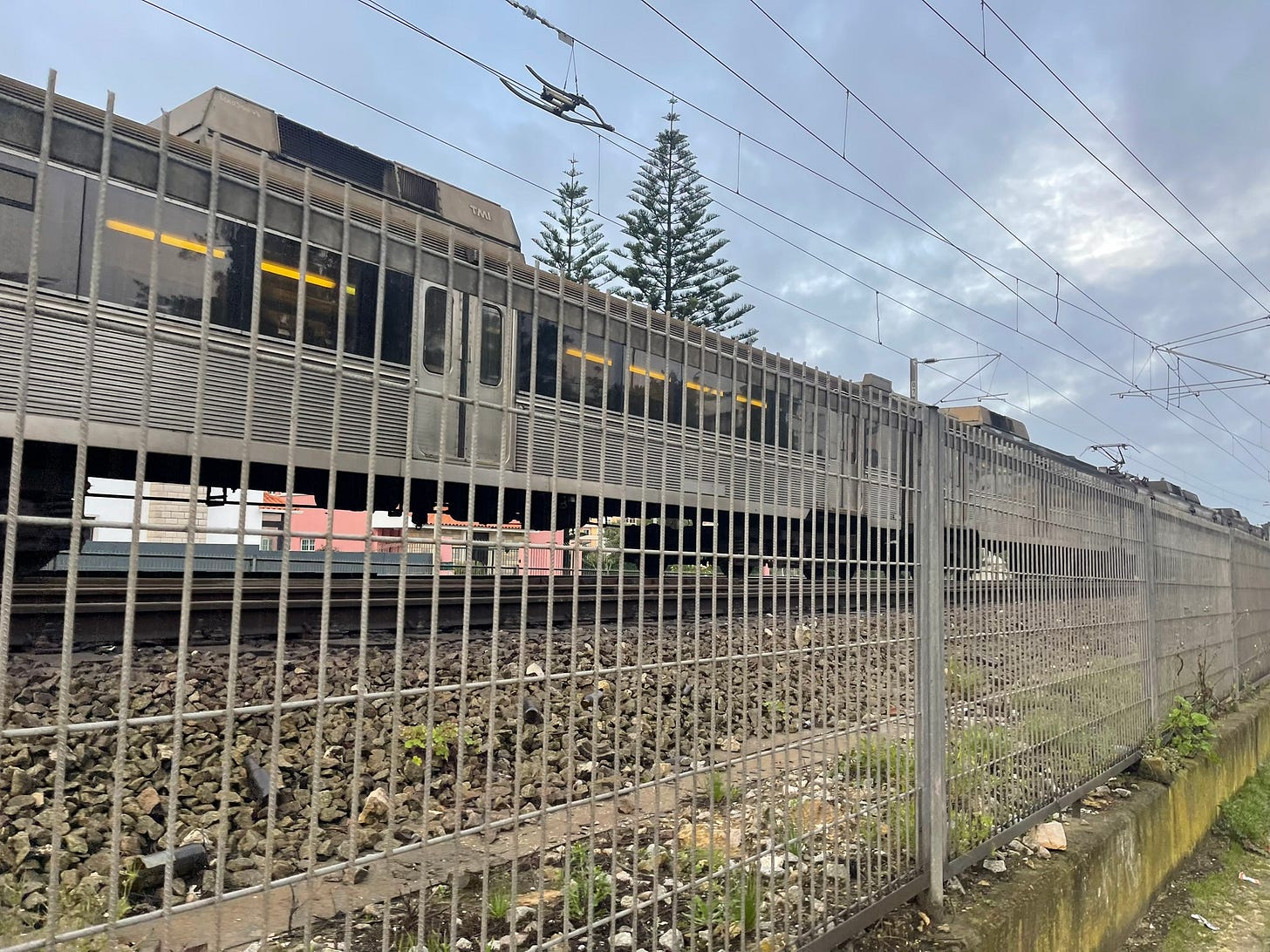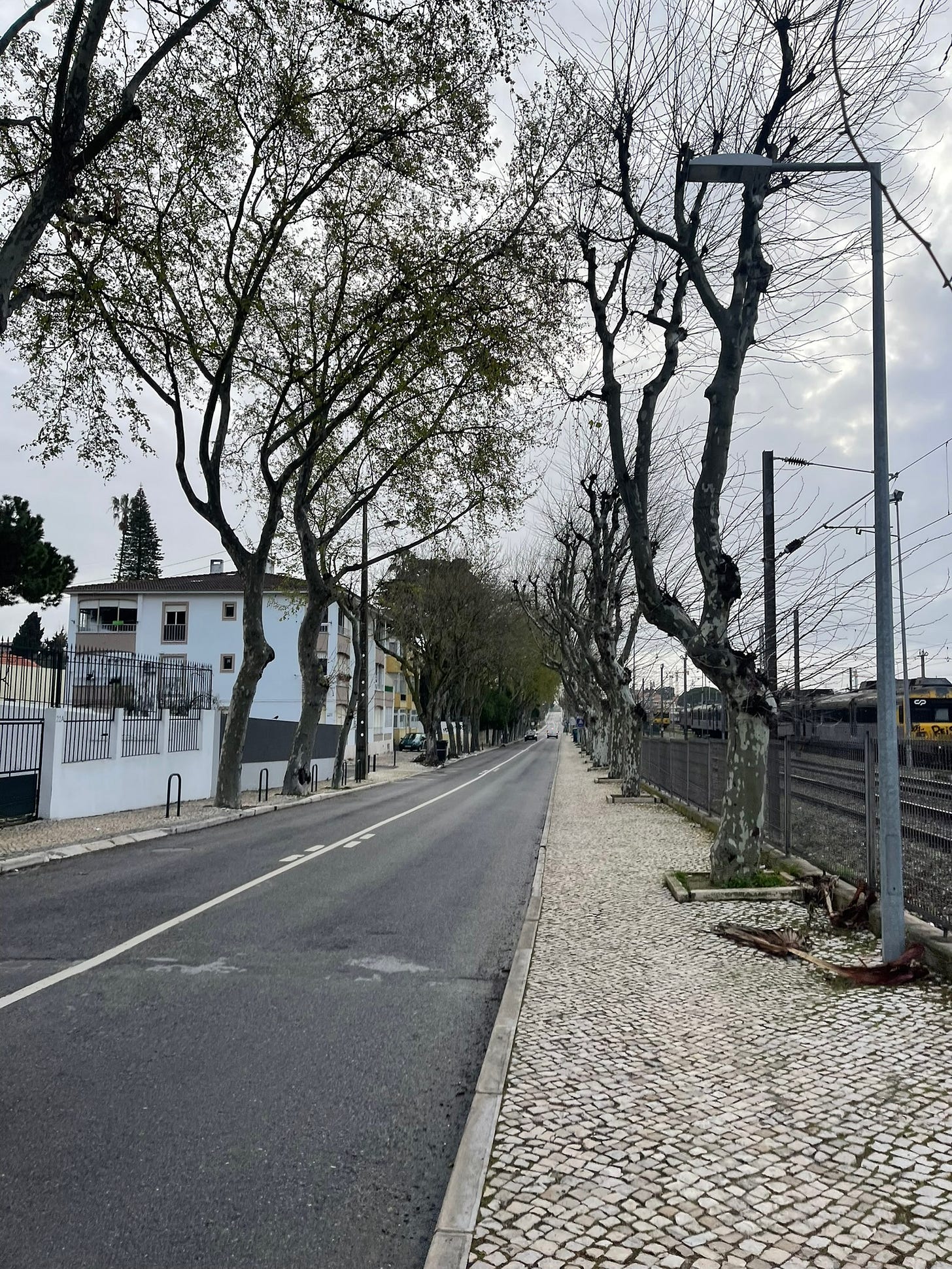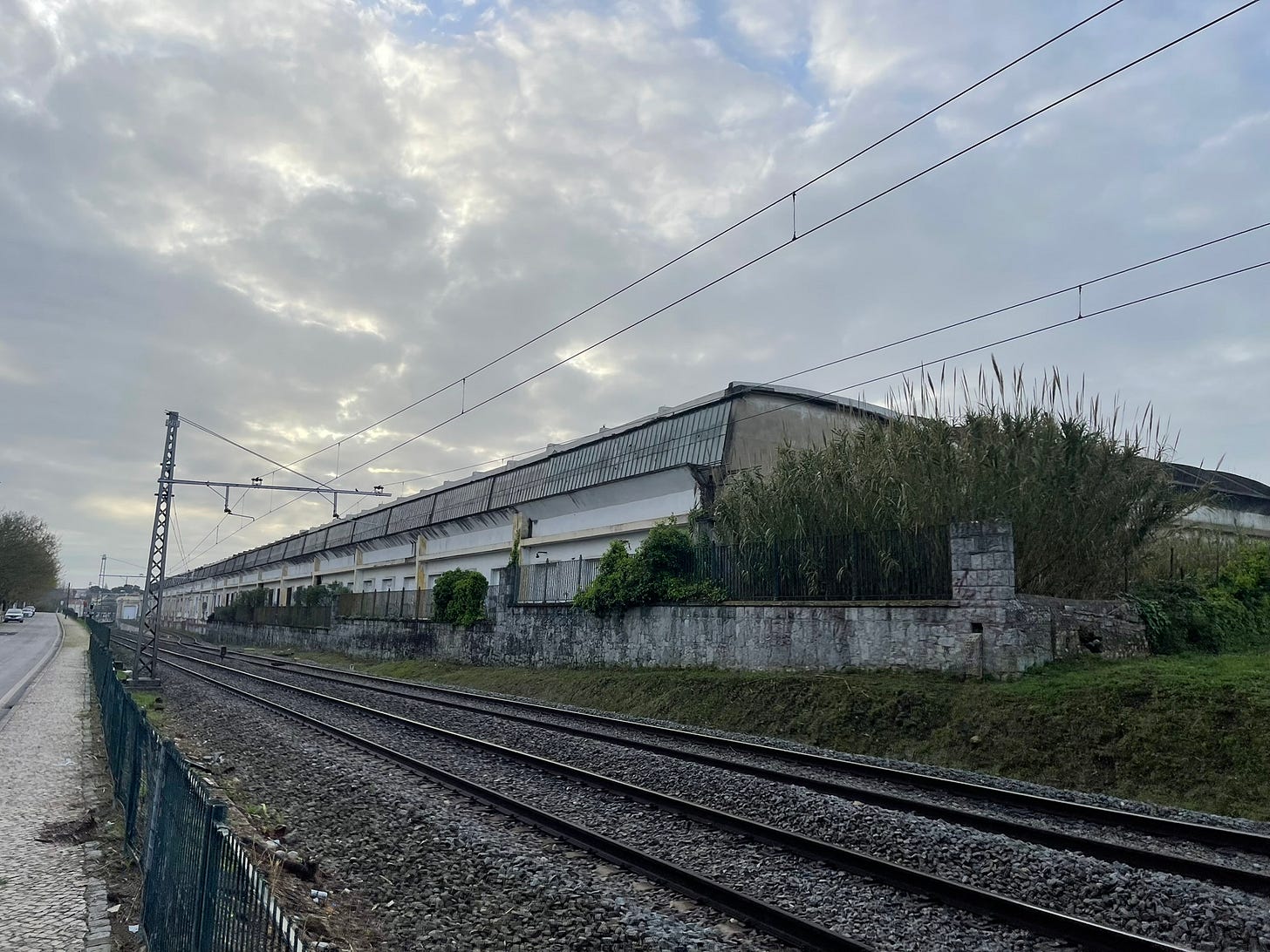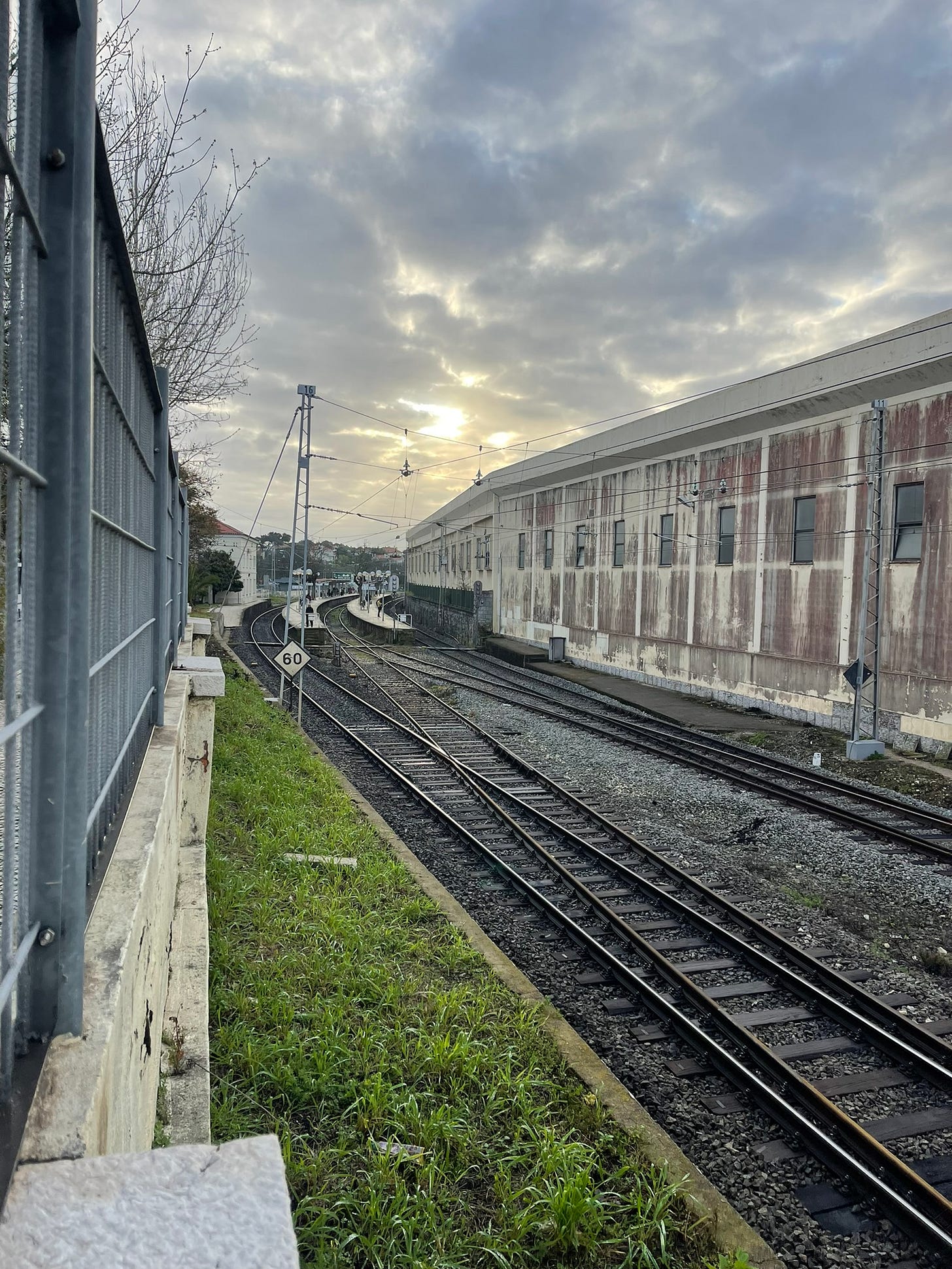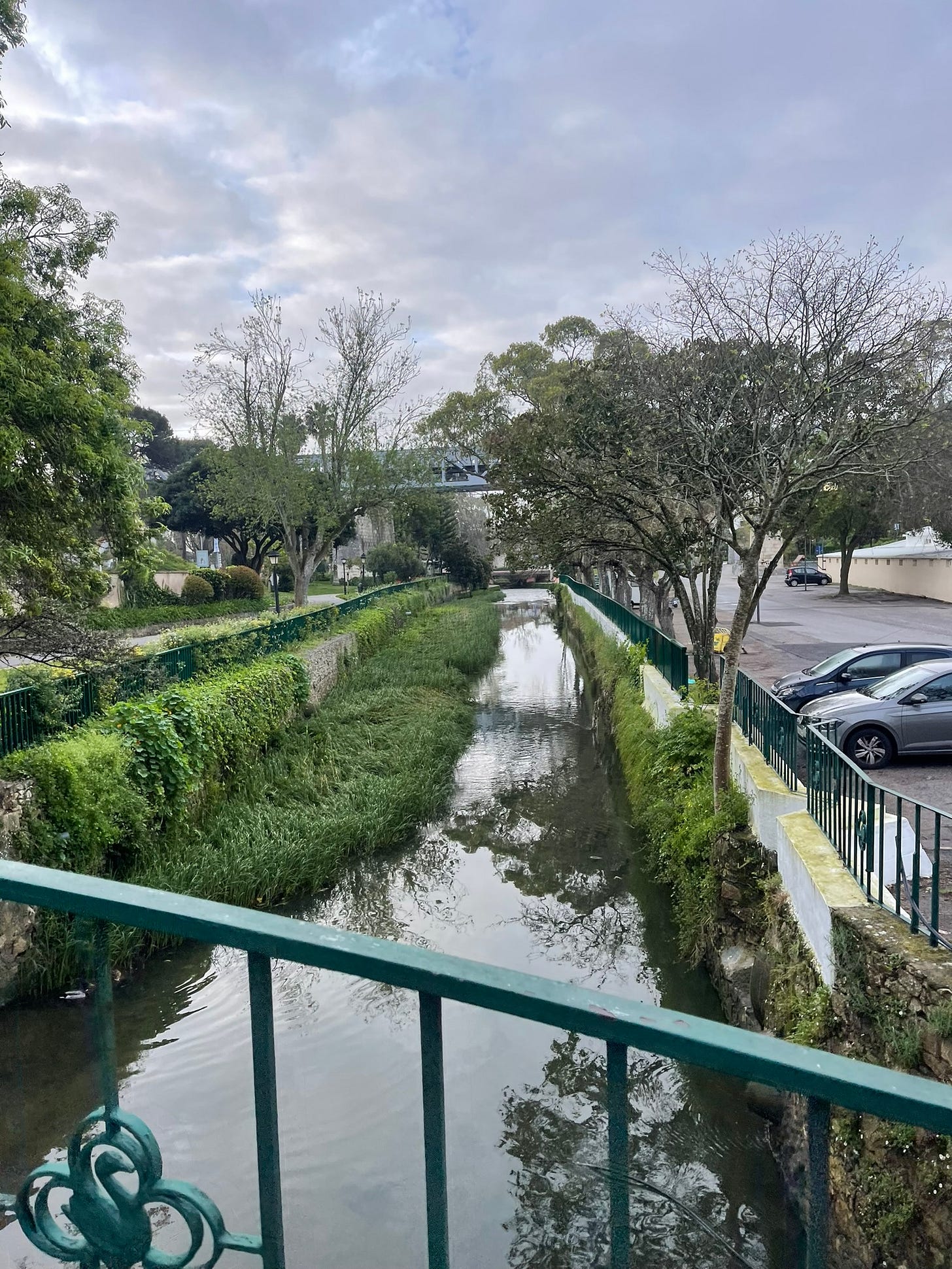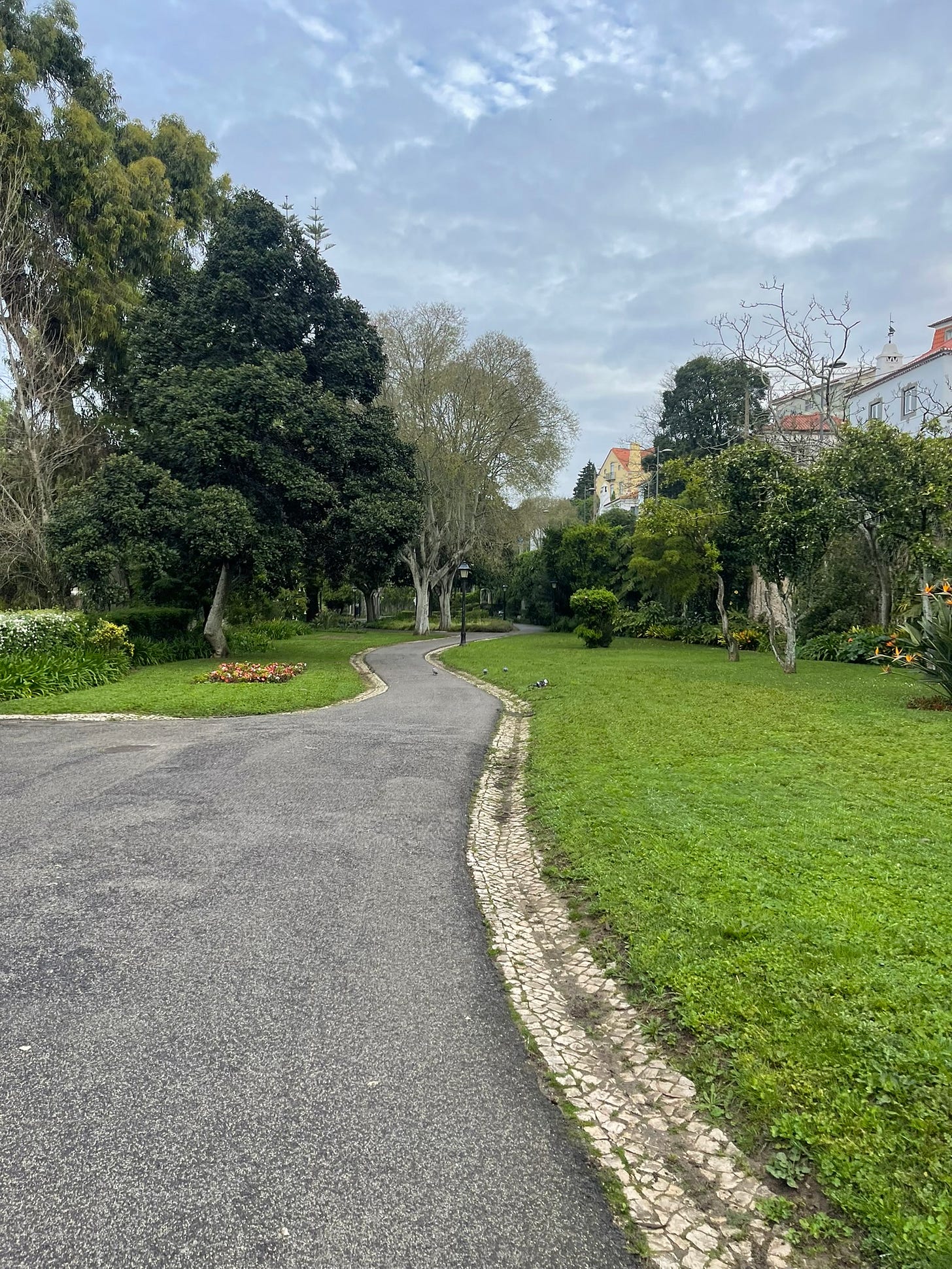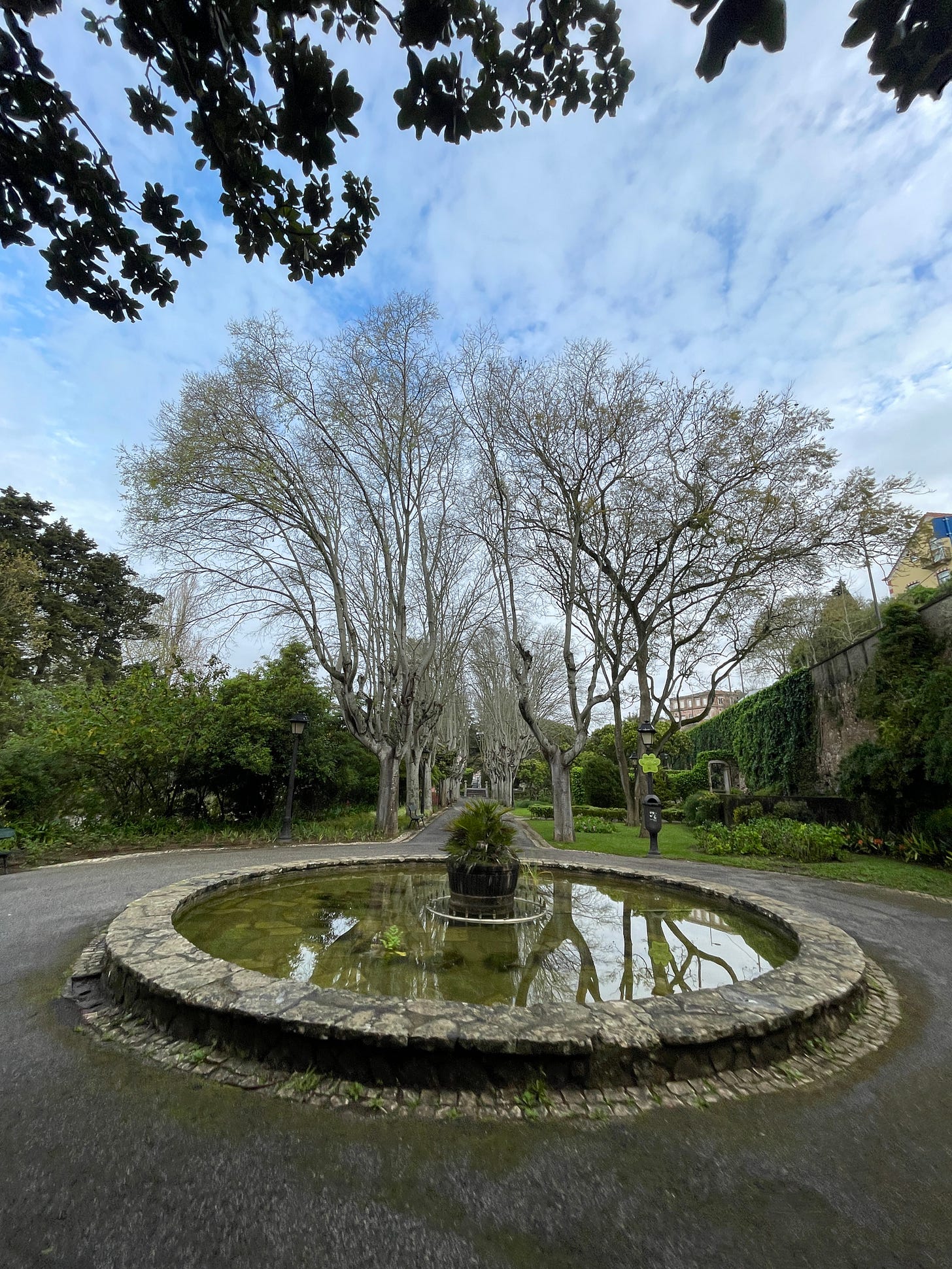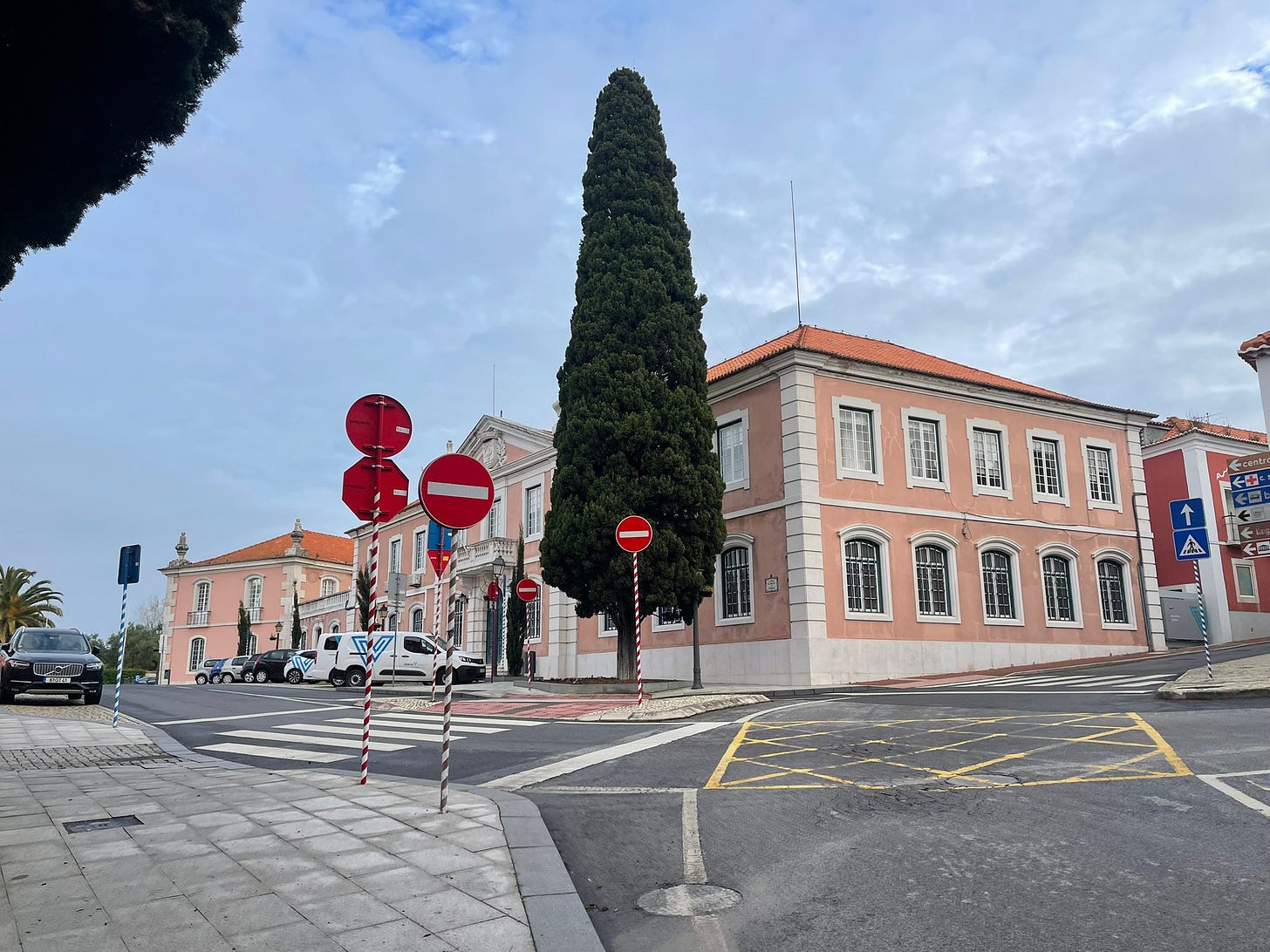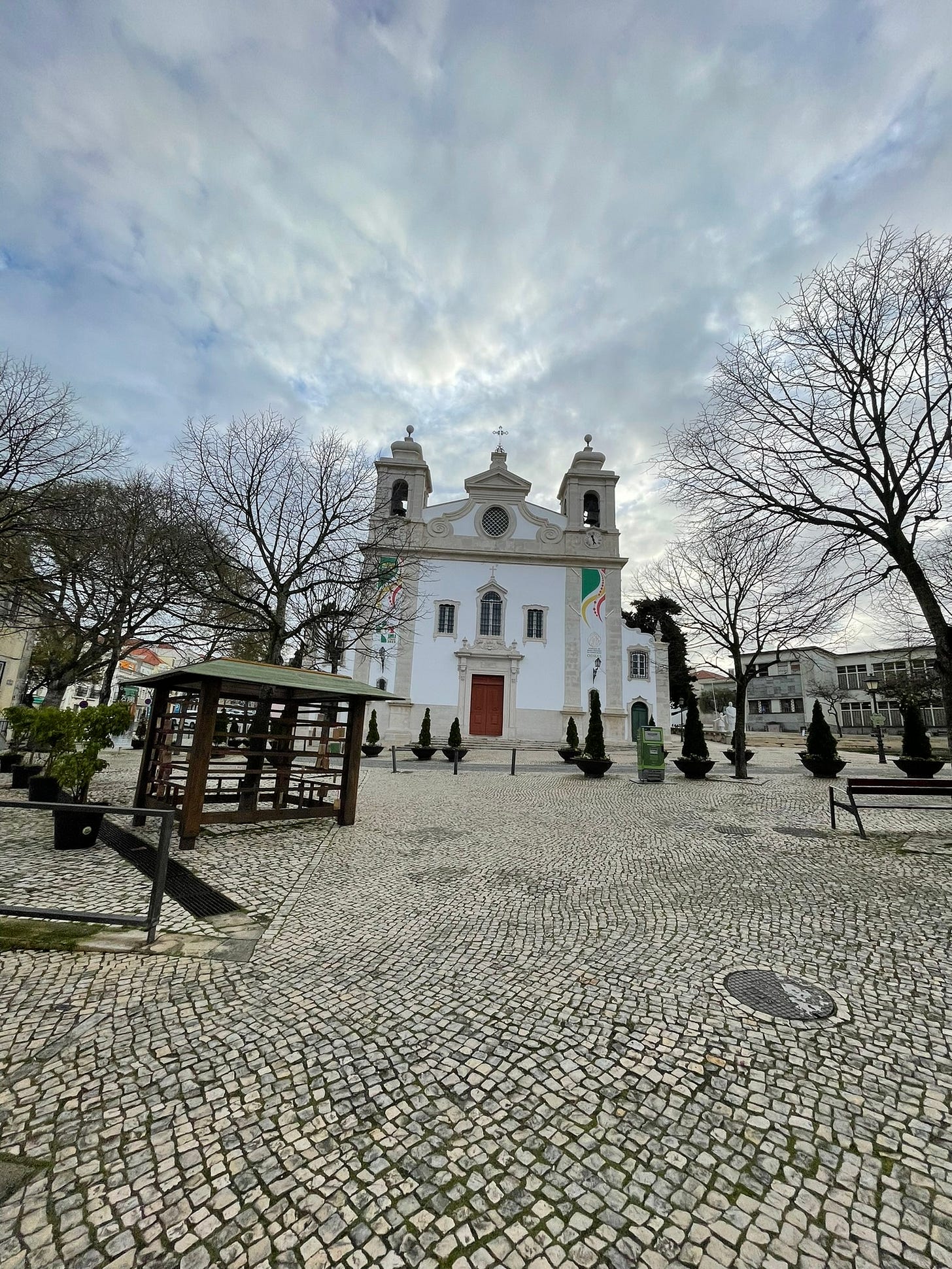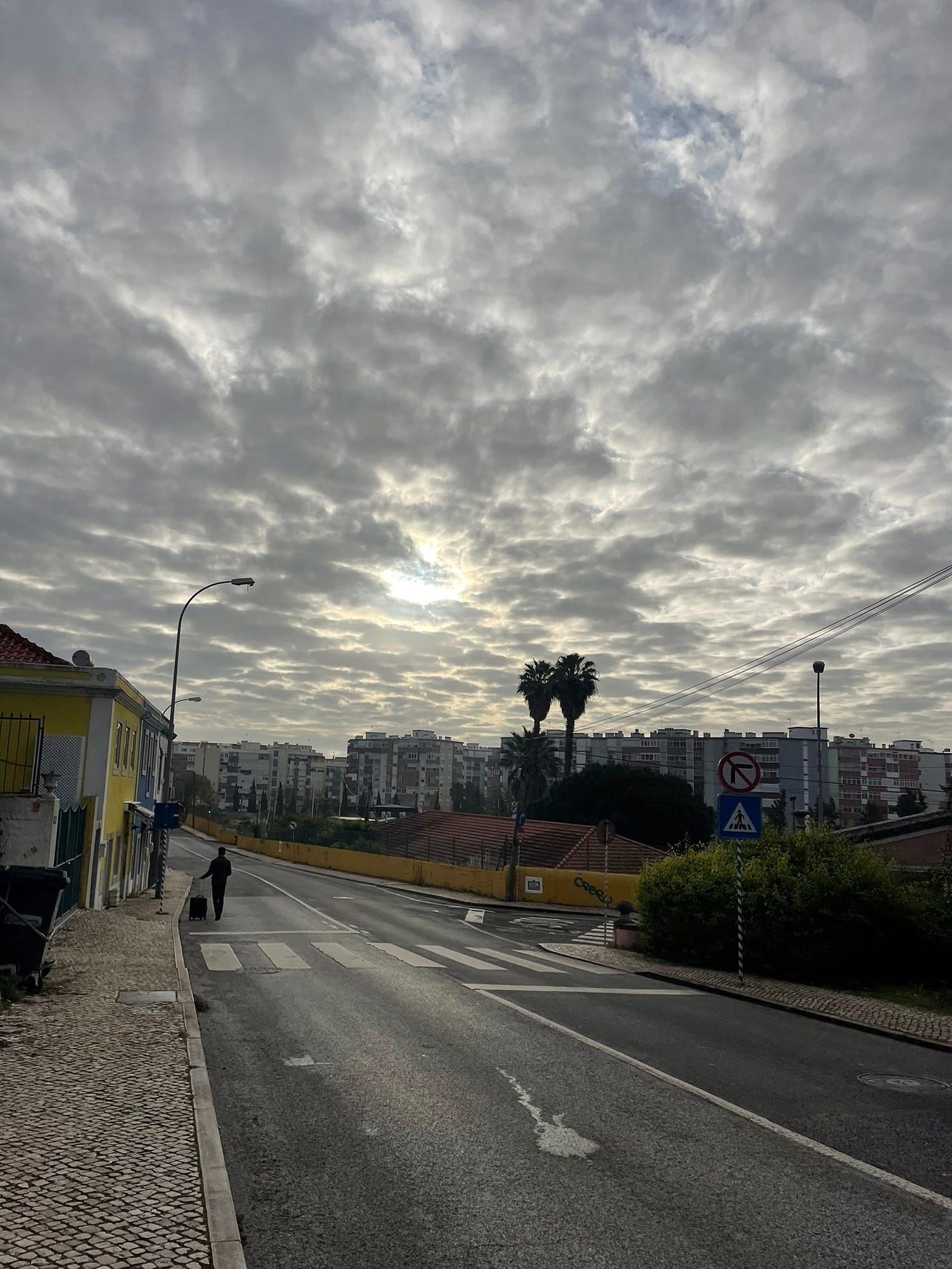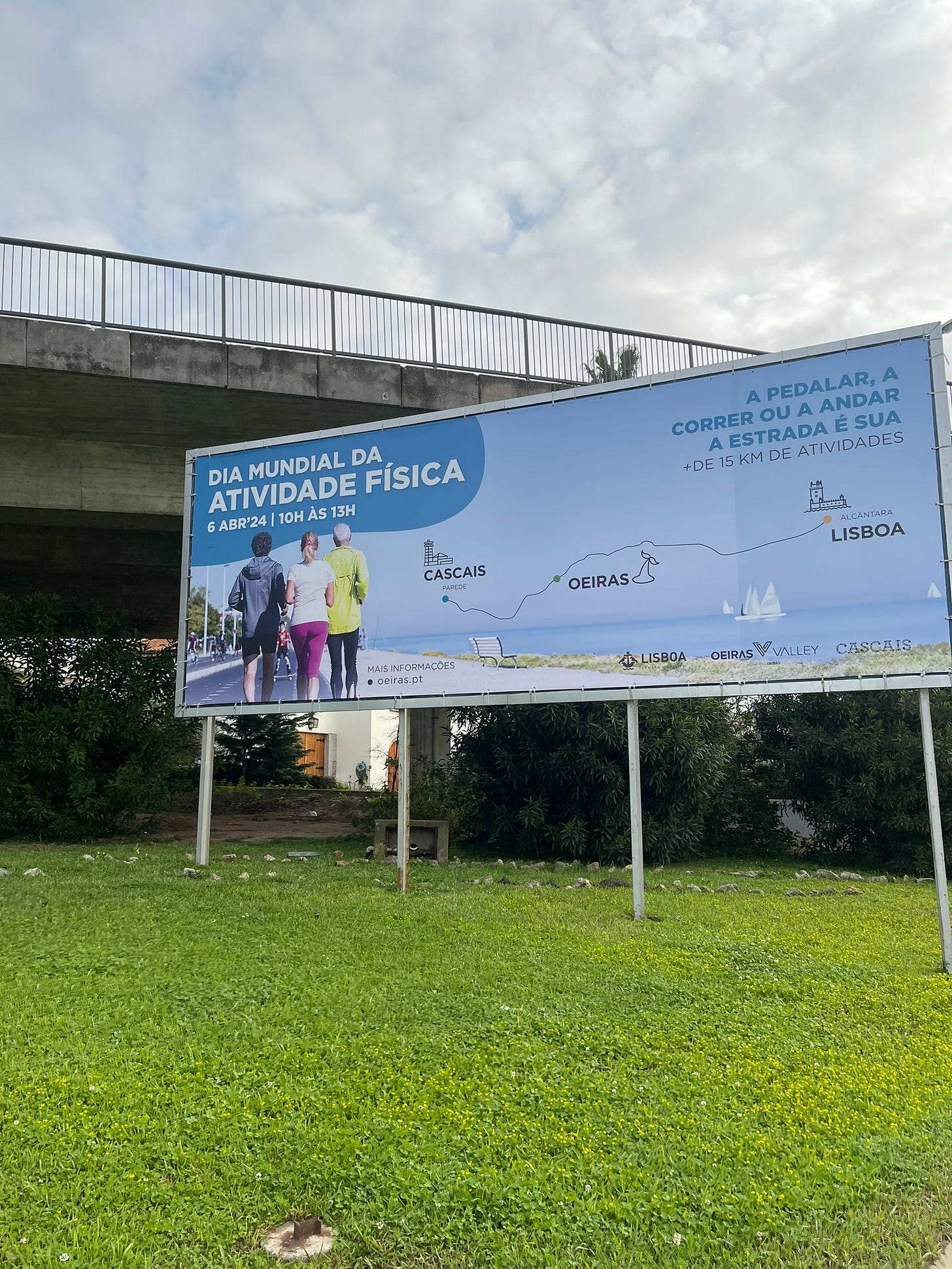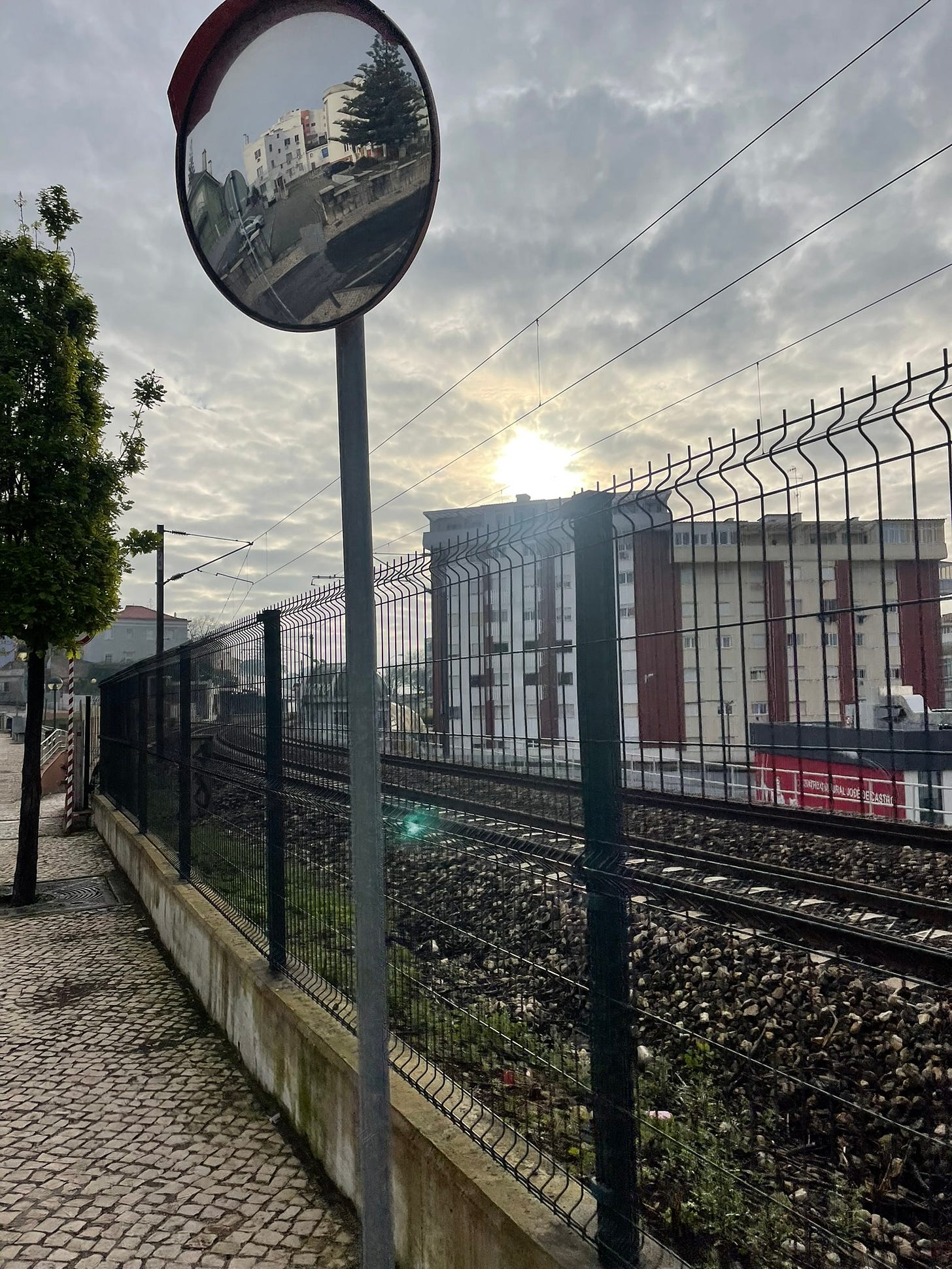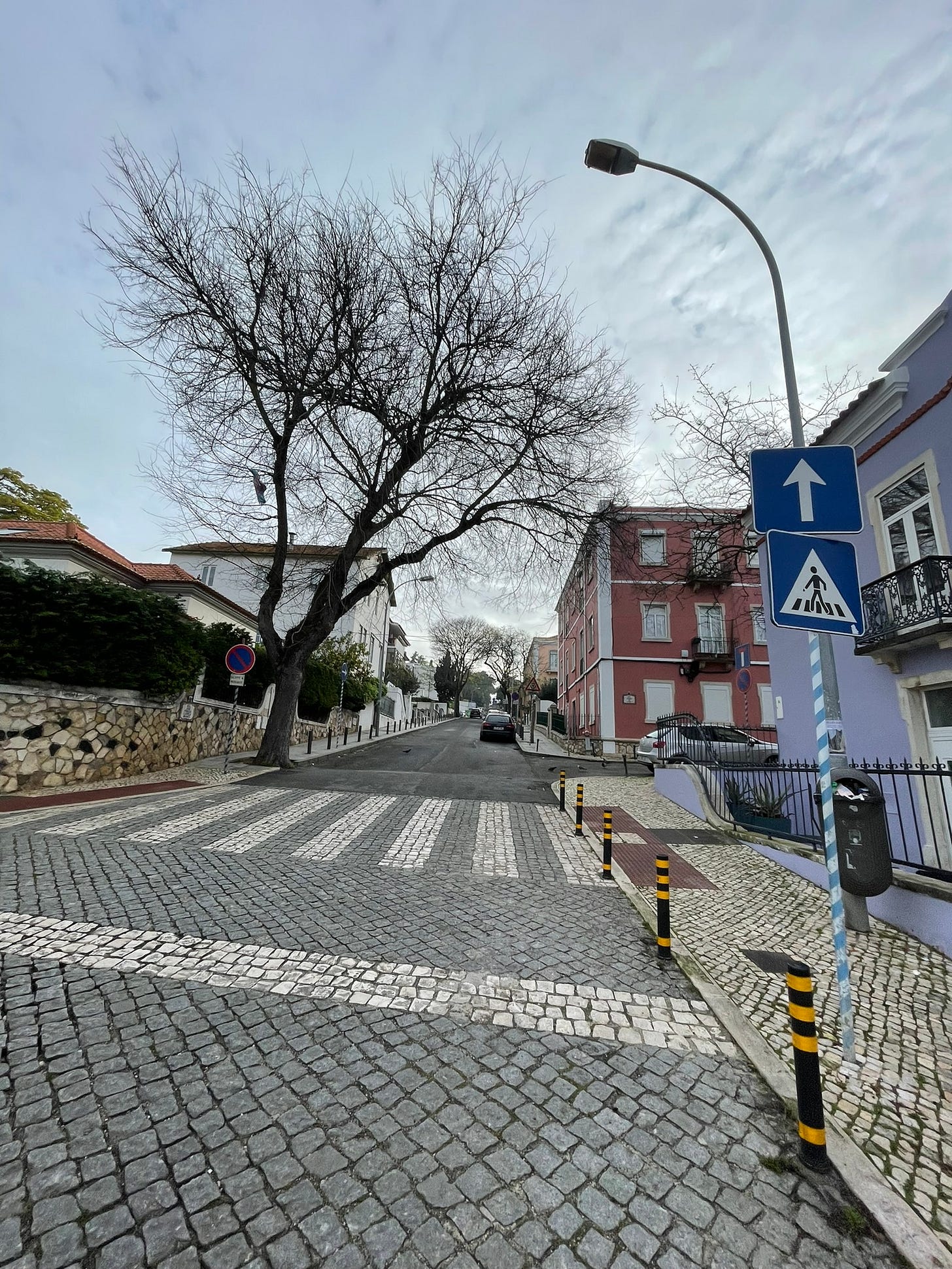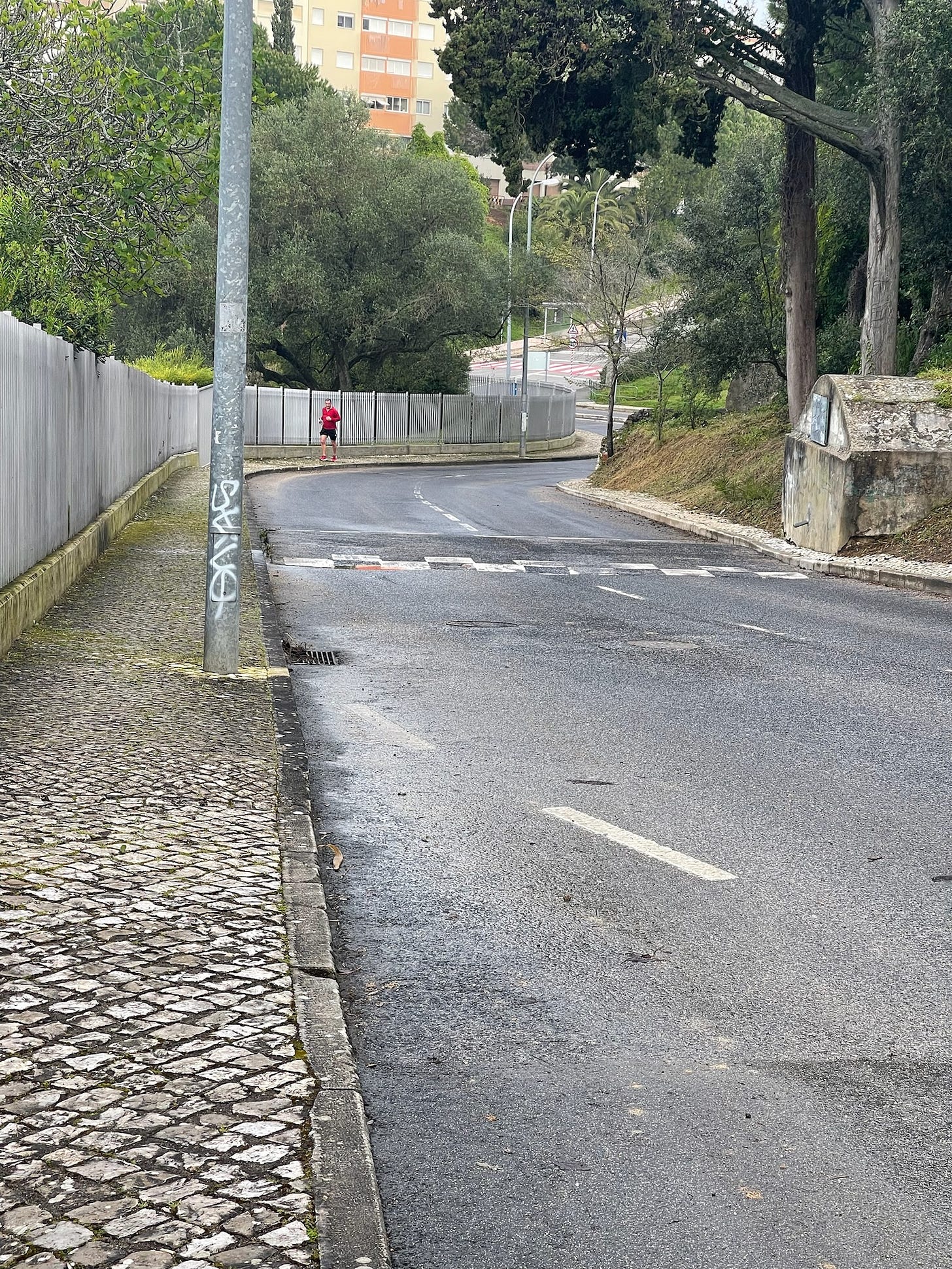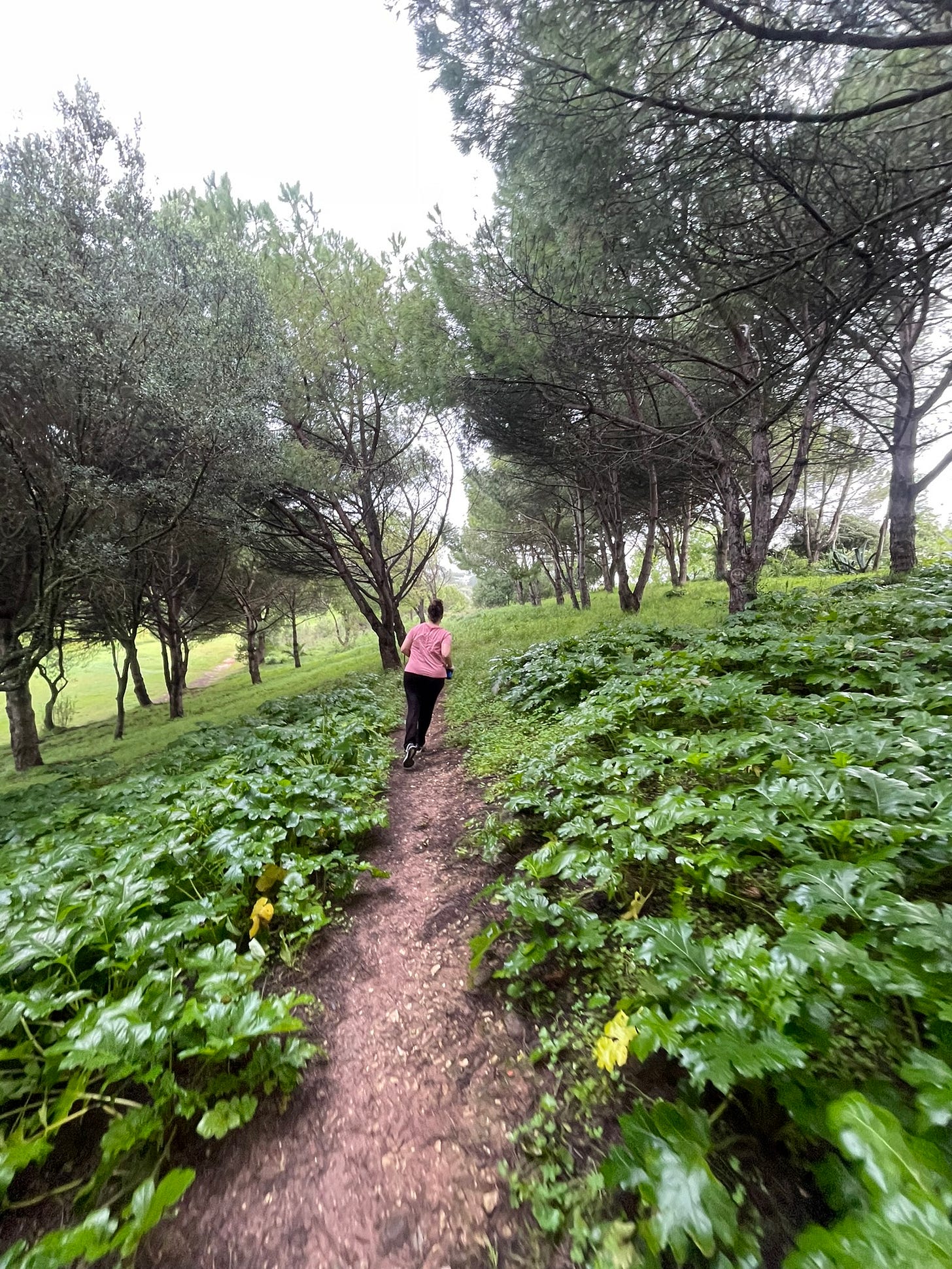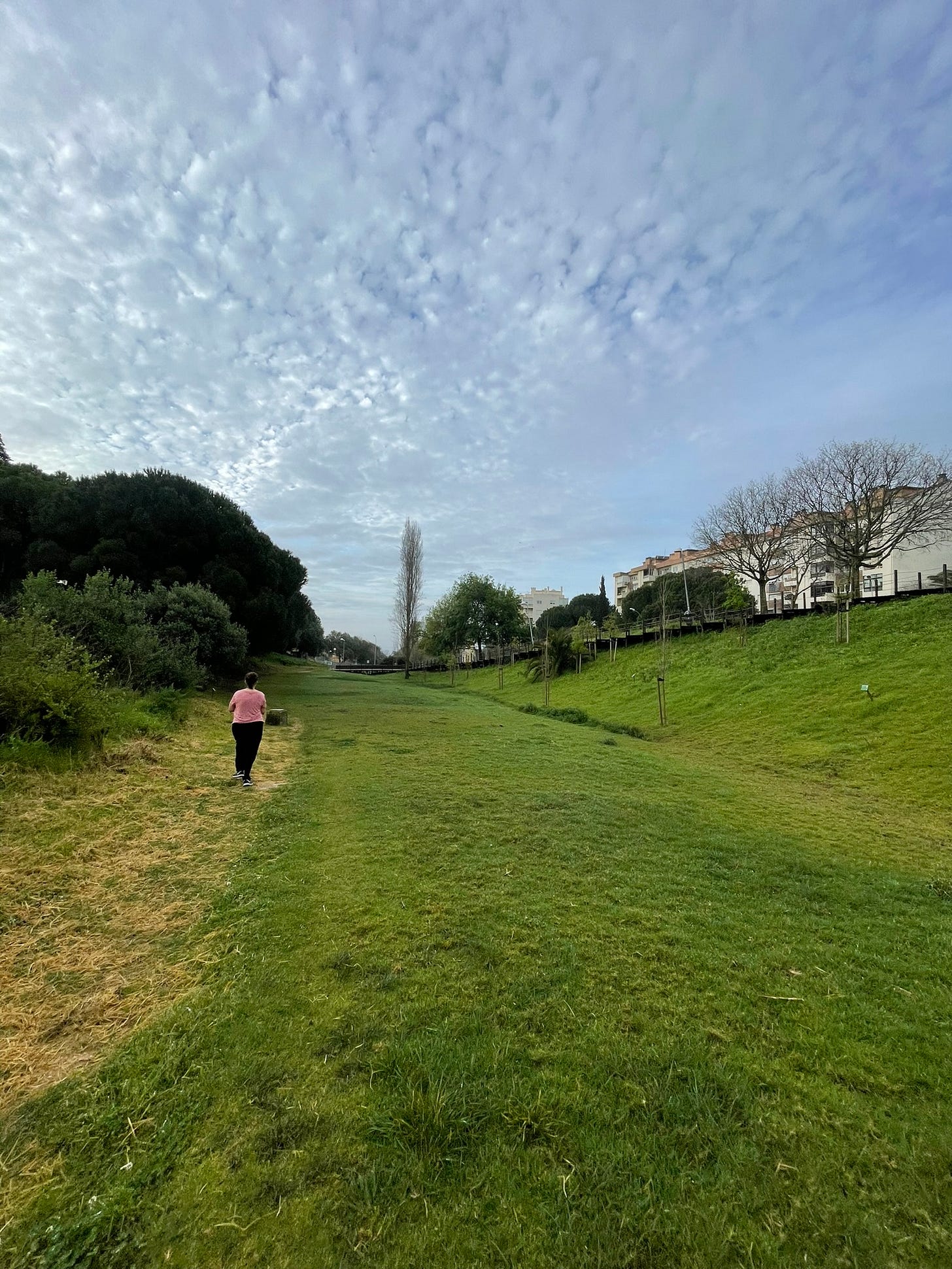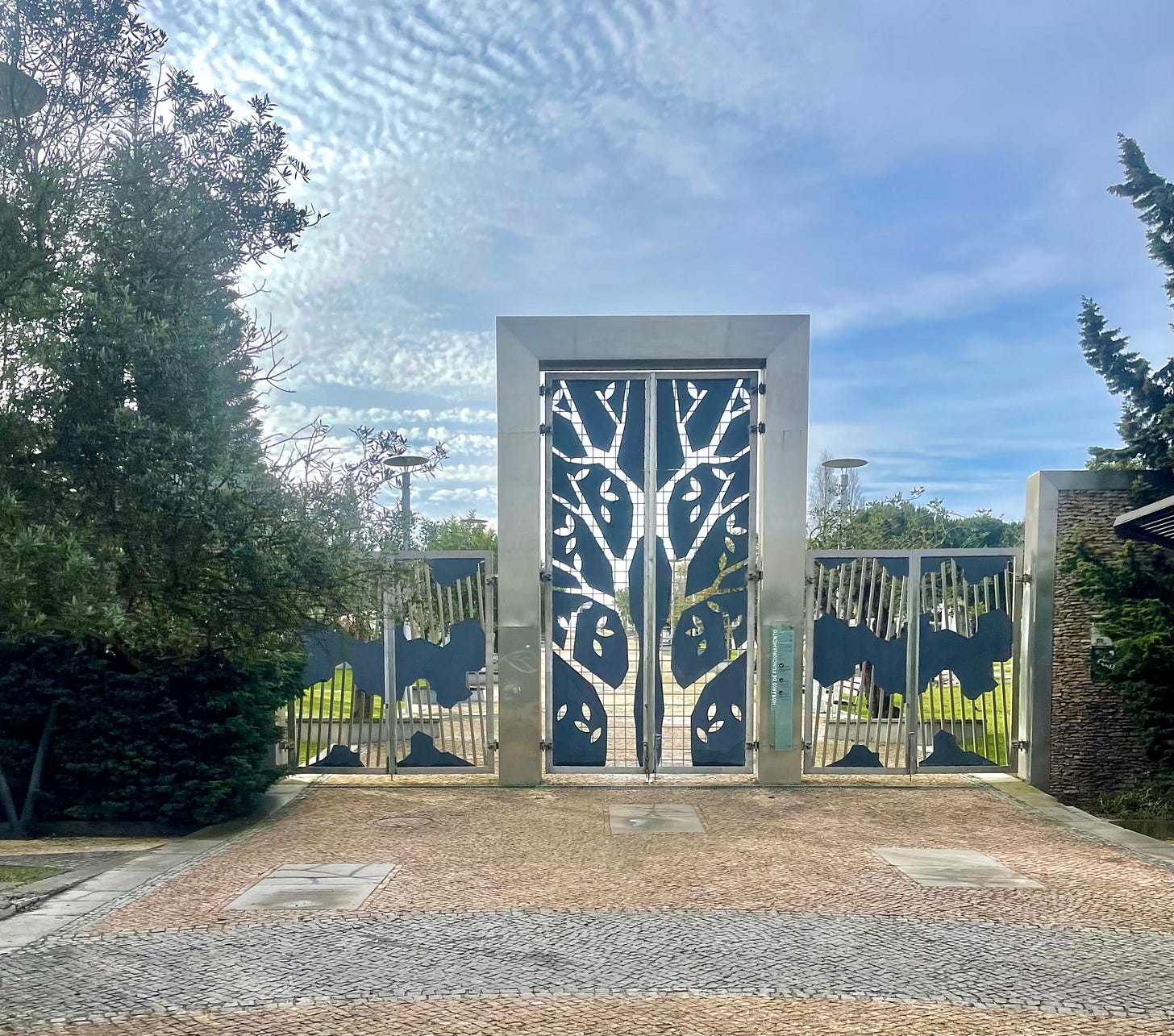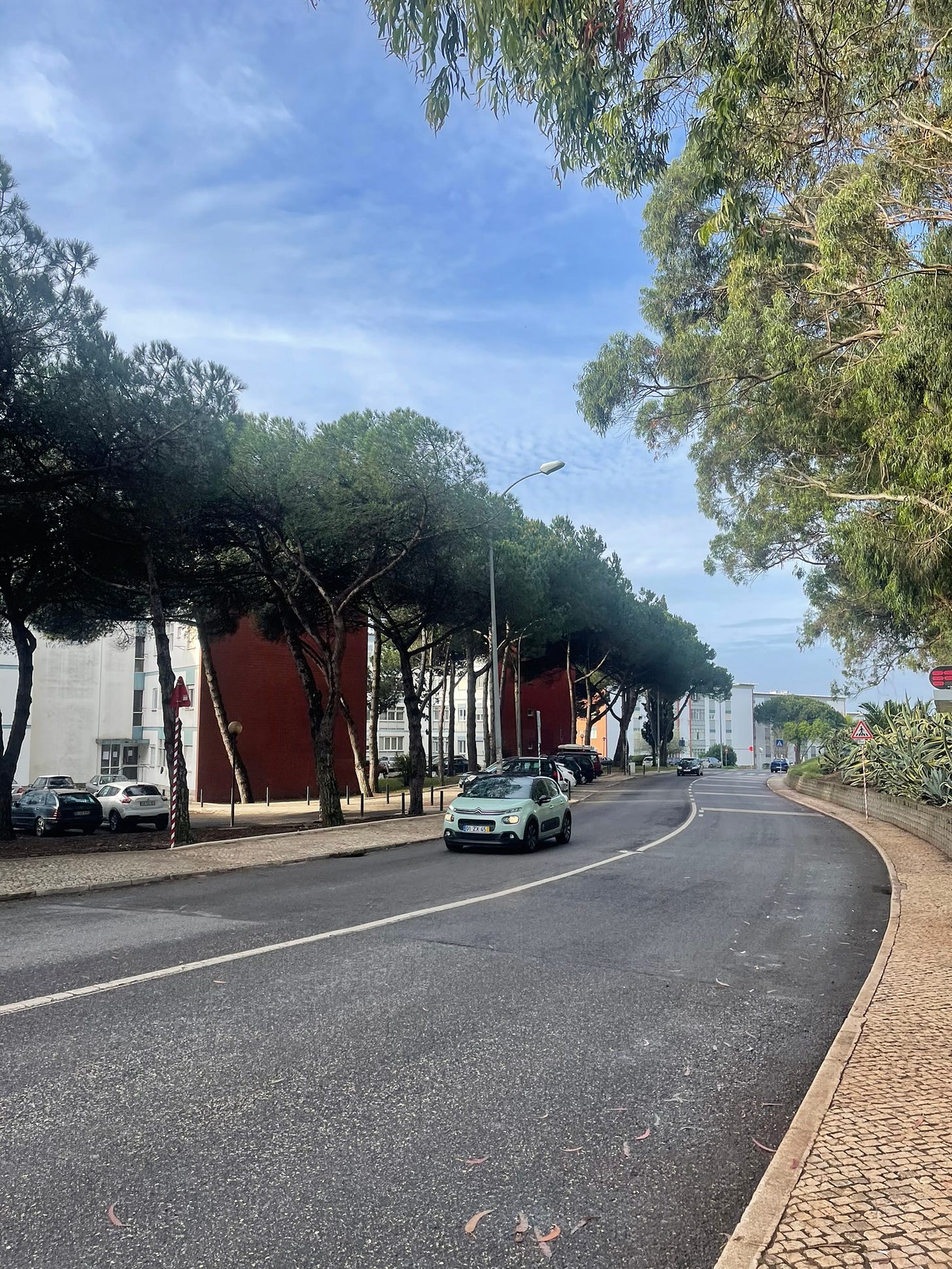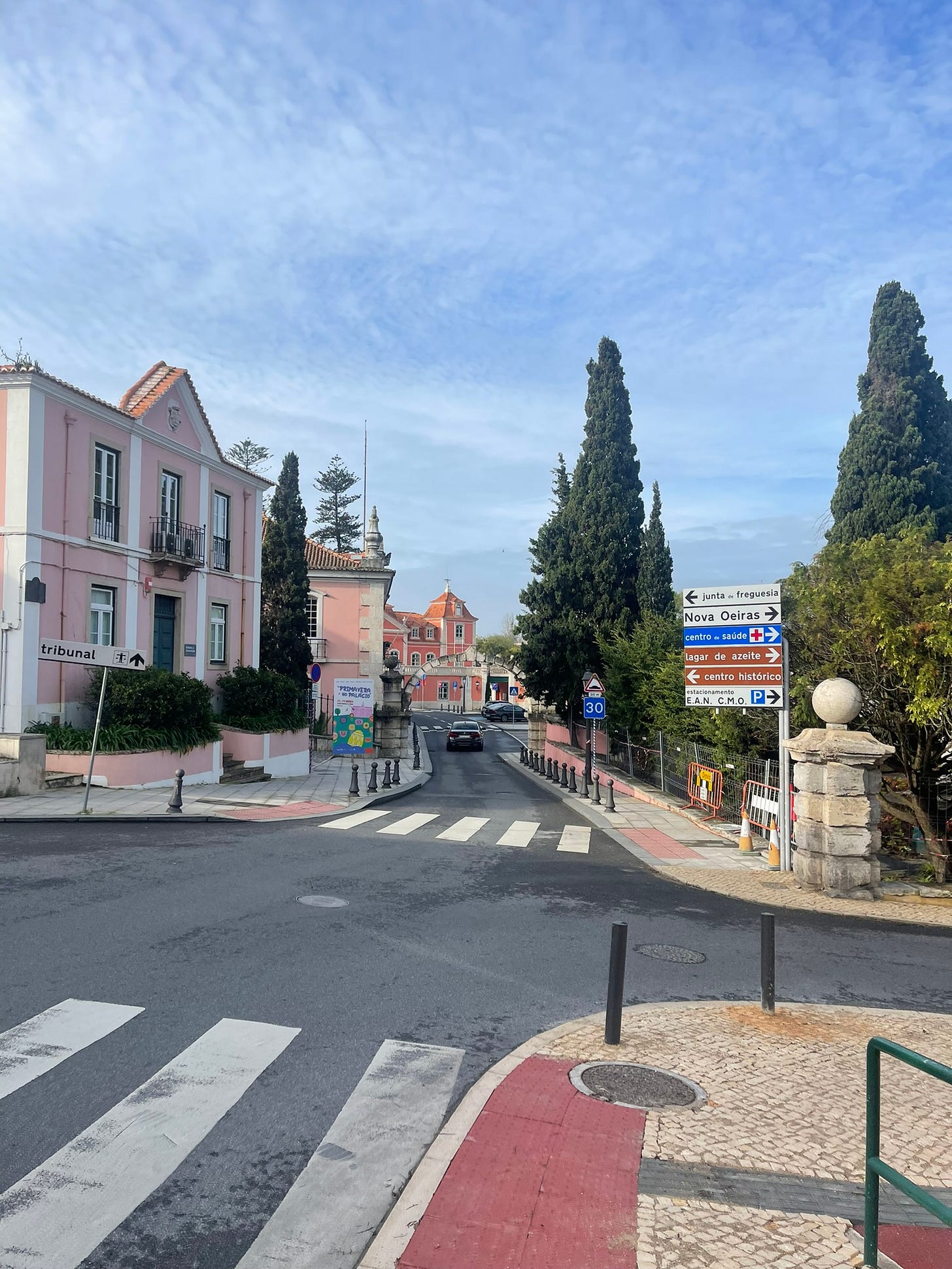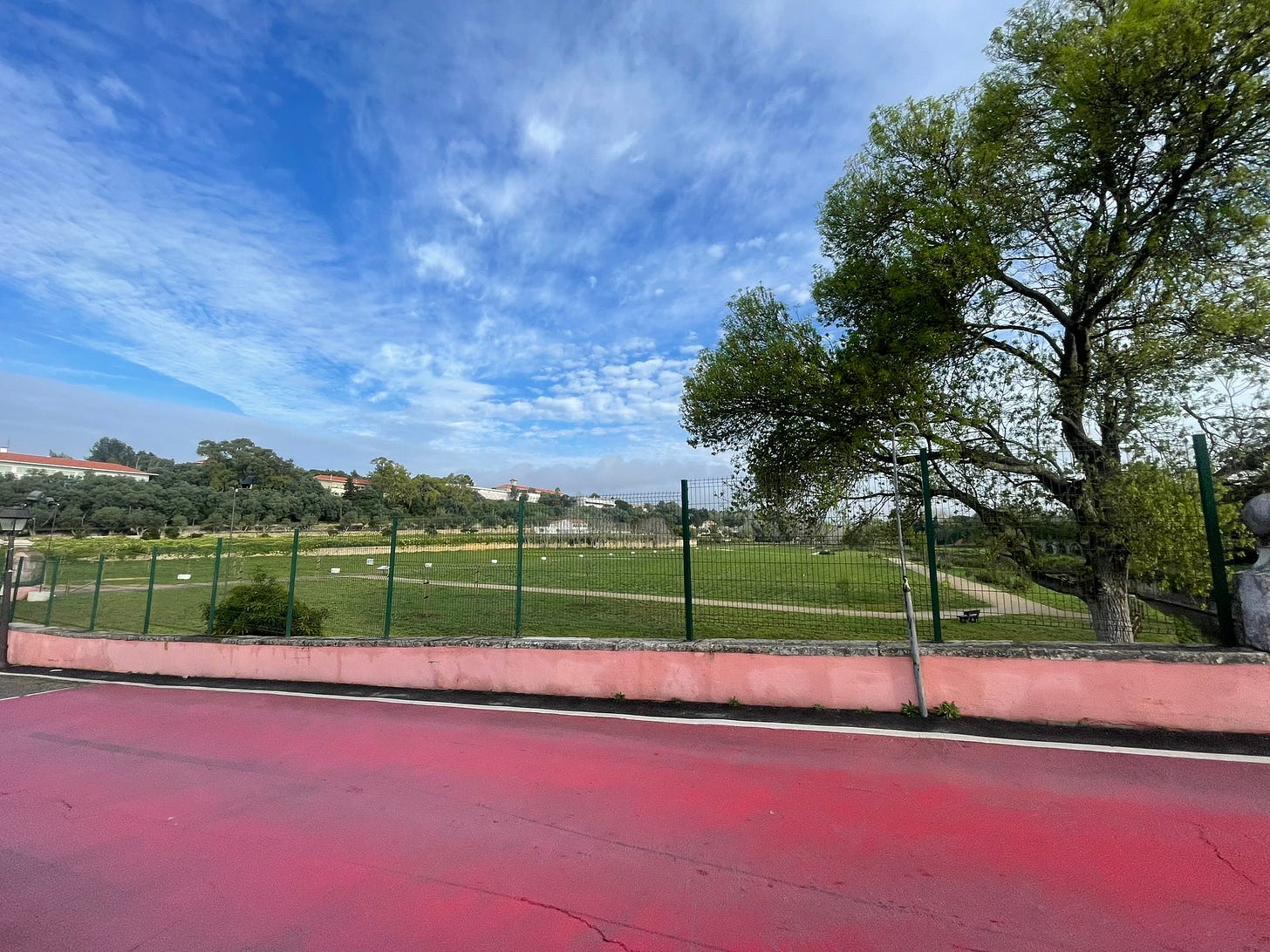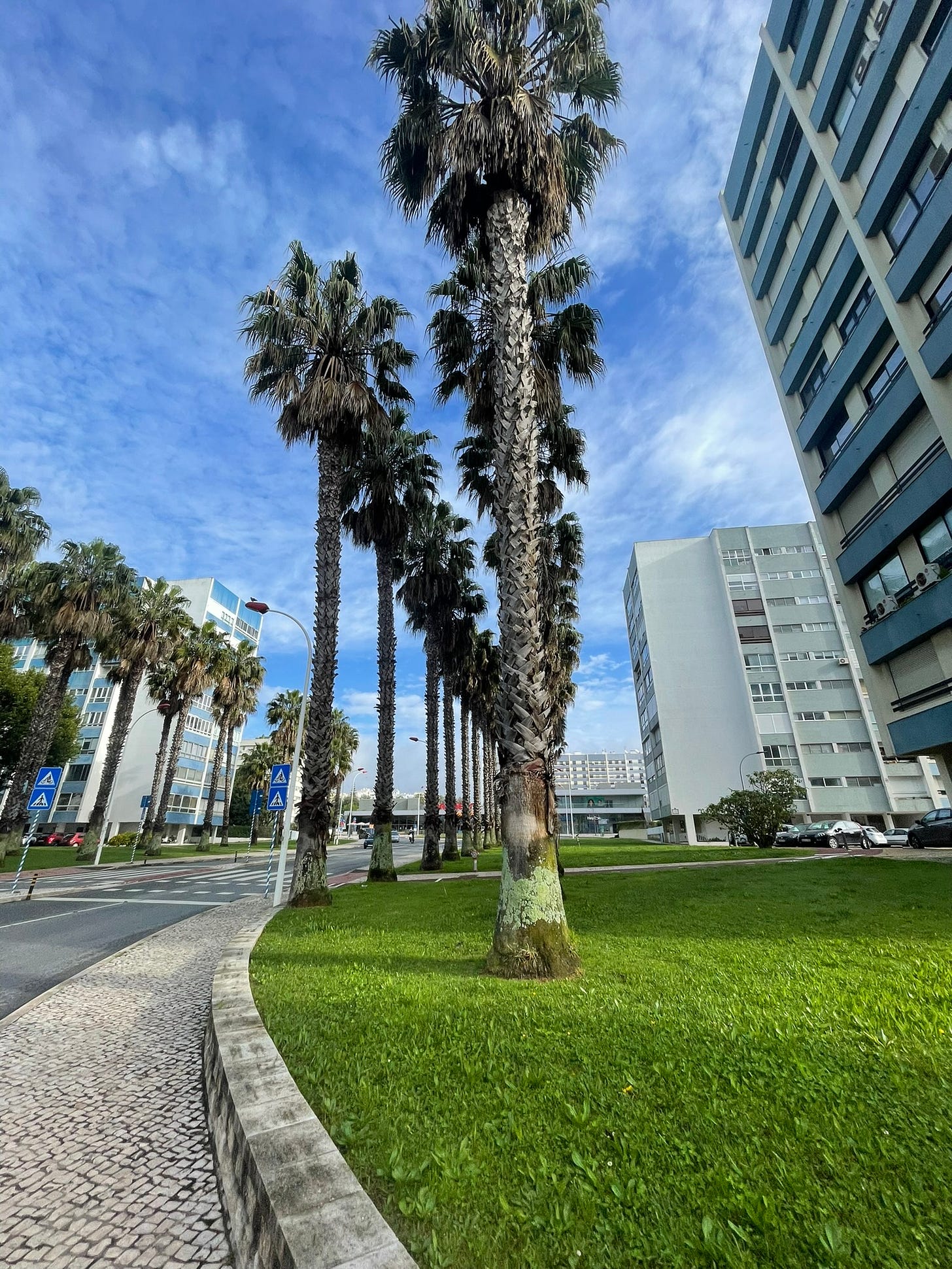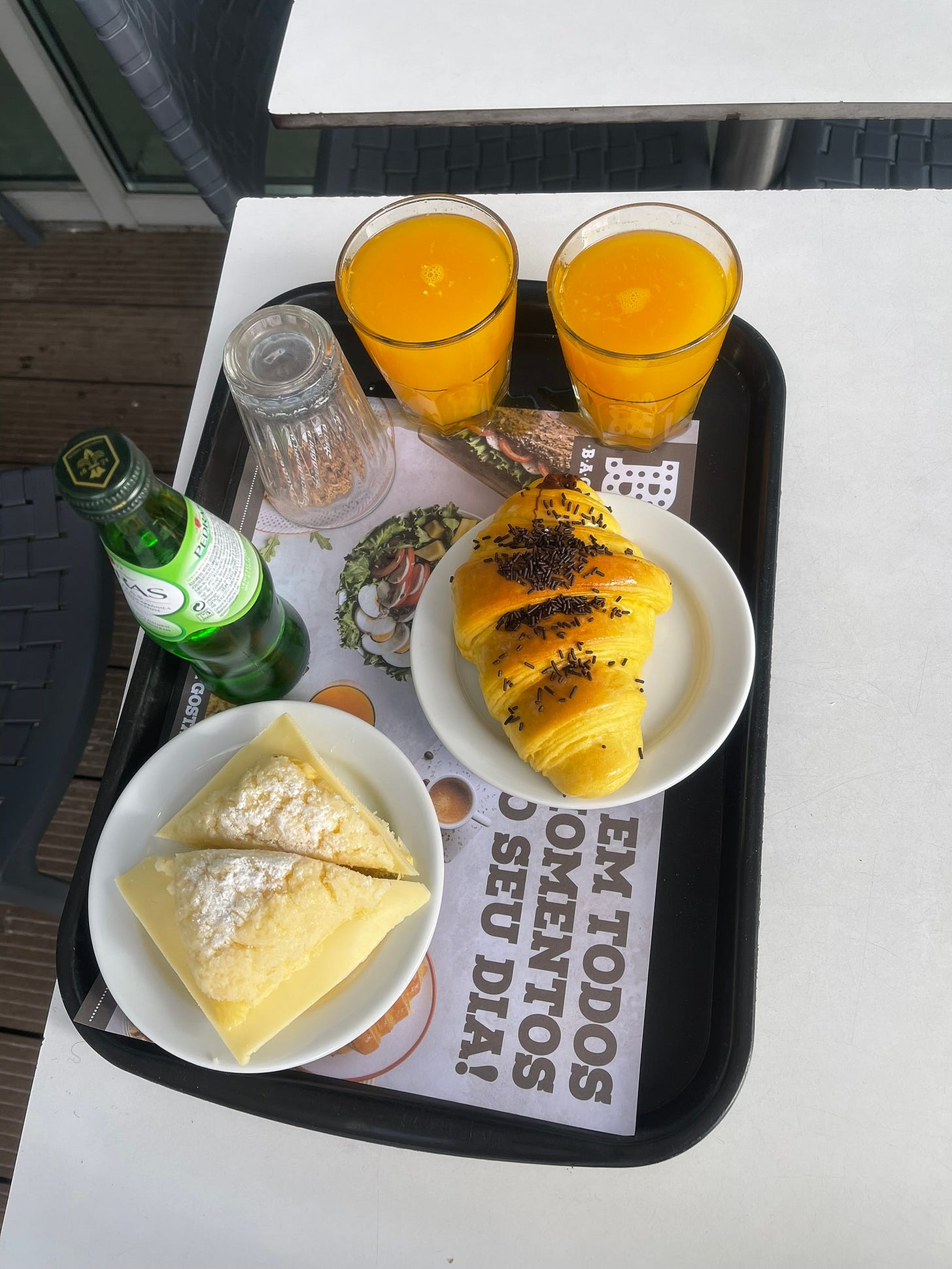March 16th, 6:36 AM
As it should be, for this time of the year, we had a week of rain, fog and cold weather. Still, not the rigorous kind of winter that lingers in my memory, from when I was a kid. Indeed, there is some terribly worrying data about the average temperatures of the oceans for the beginning of this year, following what was already a grim record set in 2023.
I am not doing Earth a favour with my runs. I gulp up so much oxygen to stay alive during my punishing climbs…
Today’s route was a travel back in time deep into my youngest memories. The route goes through some of the most important suburban municipalities of Lisbon. This is where I grew up and where a lot of my family lived and still lives.
I had a few checkpoints that I wanted to cross. Following the train track from Cascais to Lisbon seemed like an interesting choice. Train by the train.
Good news, I fiddled with Komoot the night before my run and found it useful for planning my next routes.
The route starts close to downtown Cascais, among the most expensive neighborhoods to buy or rent. Then again, everything suddenly became excessively expensive in Portugal. So much that the locals are getting pushed away further and further from the noble areas.
It’s before sunrise, and very foggy which immediately kills my expectations running toward the sunrise show.
I start going downhill which is probably something that I should consider always doing in my future runs - a slow wake up pace.
It’s a quick descent down to Avenida Marginal road, the local version of the Côte d'Azur “bord de mer”. Marginal is a scenic road that goes from Cascais to Lisbon along the ocean line - truly beautiful.
The sidewalk is wide and entertaining as usual. There used to be an historic high-rise hotel in the area with an architecture that packed some character. Nevertheless, it was excessively high and got imploded. Too bad it gave way to new buildings that are just as tall and standout from the remaining of the landscape. They might look interesting in these close up pictures but not at all in the big picture.
It’s still early (or late) for gambling but the old hotel also gave birth to a mini Vegas Mirage wannabe hotel. There are no slots in sight, but wait…
The sky is very cloudy, that’s a shame, because the sunrise view would have been sensational. It’s an easy route on the sidewalk along an empty road. In about two hours, it will be packed and it will not be fun at all to run here.
As usual it all belongs to me this early in the morning so I dash to Estoril.
There’s a sequence of expensive hotels by the ocean. If I was in charge, they would not be here but it’s not too bad. Tourists bring money and money helps keeping everything neat and beautiful.
From Cascais to Lisbon there is almost a continuous urban area, ~20 km in a straight line of houses, buildings and road by the ocean. It is estimated that 80% of the Portuguese population lives by the ocean - quite a privilege.
Glued to Cascais is the town of Estoril, known for its Casino, for a racetrack that once held Formula 1 races, and for fine expensive housing. The casino is touted as being the largest in Europe, a mini Vegas experience away from the desert.
Cascais and Estoril are also home to some of the finest restaurants for fresh fish and seafood. On the days of my runs I end up burning as much as 5000 kcal, so I am entitled to eat pretty much anything that I want. Too bad my wallet is not as elastic as my appetite. The train track goes right beside the Marginal road it will now move slightly away from the ocean shore and we follow to venture into the suburban homes.
We hit the first climb of the day as the train digs through a tunnel. On top of the hill stands another brand new hotel that replaced an older one. It always reminded me of the French Riviera, hence my “bord de mer” reference. Another one that would have not passed my sieve.
I hope that my stomping and puffing don’t wake up anyone . Everything is so quiet and peaceful, my bird friends keep me company and I am pleasantly surprised on how everything seems to be well cared, clean and in harmony. It’s easy to get blinded by the tunnel vision to next bumper when driving by. When running, headphone free, and with desert streets it becomes easier to read all the paragraphs in the book.
It’s a very dense urban area landscape, but there are a lot of trees that make it feel lighter and sparser. Everyone is sleeping, I can run wherever I want, even in the middle of the streets (carefully).
Portugal has come a long way since the early 80’s. There has been money very well spent on renovating a lot of schools, building health centers, access roads and sidewalks, supporting infrastructures. By now you might have noticed a patter on these descriptions. We had, and still have, a very strong construction lobby that slurped/s most of the public investment. We have the concrete and asphalt but not the motivated people and necessary goods to properly utilize them. We are on the right course but at the wrong pace.
Not me, today, I am on the right course and at a reasonable pace, the route remains pleasant and serene. I am king of the sidewalk, all that money did not go to waste.
I just realized that inadvertently we might have solved some of the mistakes that come from our lack of organized planning. The architecture of many of the building is very dissimilar and even random, that used to hurt my eyes. As many trees have grown, they have become shields and camouflage that blend the landscape into a more amicable view.
Today is not one of my best days. These runs have become so enticing to me that I don’t sleep well on the night before. It’s not that I become overly excited, it’s some kind of subliminal dopamine that drives my brain, and keeps waking me up all night long - “Is it time to go already?” - OK, sometimes I do become overly excited with the route (see funicular, stage 8…)
My heart rate is unusually high for such an easy course so far, and I know what’s coming up ahead. I proceed at a reduced cadence.
The ocean is a few hundred meters away, we can smell the ocean breeze and I have watched it eat cars alive through corrosion many years ago. If you need a testbed for inox ratings, or galvanization durability, this is the spot. The Atlantic has teeth.
The skaters and BMX riders will probably sleep though most of the morning. It’s just me and the trees awake. The pictures remain people-less.
I am mostly going through single-family homes streets, and away from the town centers. I am hiding the bakeries away from my stomach, I never eat before my runs.
Going by these houses on the sidewalk is sure to surprise you with some barking scares. Sometimes, it becomes impossibly annoying, as the dogs bark strident untuned off beat solos. They are sleeping today.
I tip toe from Estoril to S. João do Estoril then São Pedro do Estoril (so many saints) and arrive at Jardins da Parede apartment complex. Parede is a small town and Jardins stands for gardens.
Roundabouts are an ingenuous way to expedite traffic flow, and most towns in Portugal are flooded with these crop circles. I will never forget a day when I visited a city hall for work, and was looking at their plan for new “green spaces” in their county. The bulk of them was coming from roundabouts. I laughed my socks off. These masterminds found a way of artificially inflating their green space propaganda by accounting for the roundabouts lawn. They do are nice, but seriously…
As we get closer to Lisbon, and further away from the Ocean, the building heights get high on steroids. It’s not too bad in this area of Parede.
In a few hours these streets will be very busy with the locals going about getting their fresh bread, doing local shopping, and even buying a newspaper! In the center of these older towns, it’s the elders who hold the fort and prolong the traditions. Most of the local bakeries and specialty shops were born here and never ventured to franchise. Their employees have aged with the furniture and to live that long it means that they had quality and stuck to their principles. They provide a unique kind of warmth that extends home to the streets.
I close my nostrils to the coffee and pastry scents and zoom through the still deserted city center. We are at km 7.5 happily cruising through a perfectly flat terrain.
Next on the punchcard is the small city of Carcavelos, a twin of Parede. The route goes through the sleeping neighbors houses, planted in-between grown-up trees. There are houses from different decades, some needing renovation, very few in ruins and some jewels. These are quiet neighborhoods that are a gift for the ones living there.
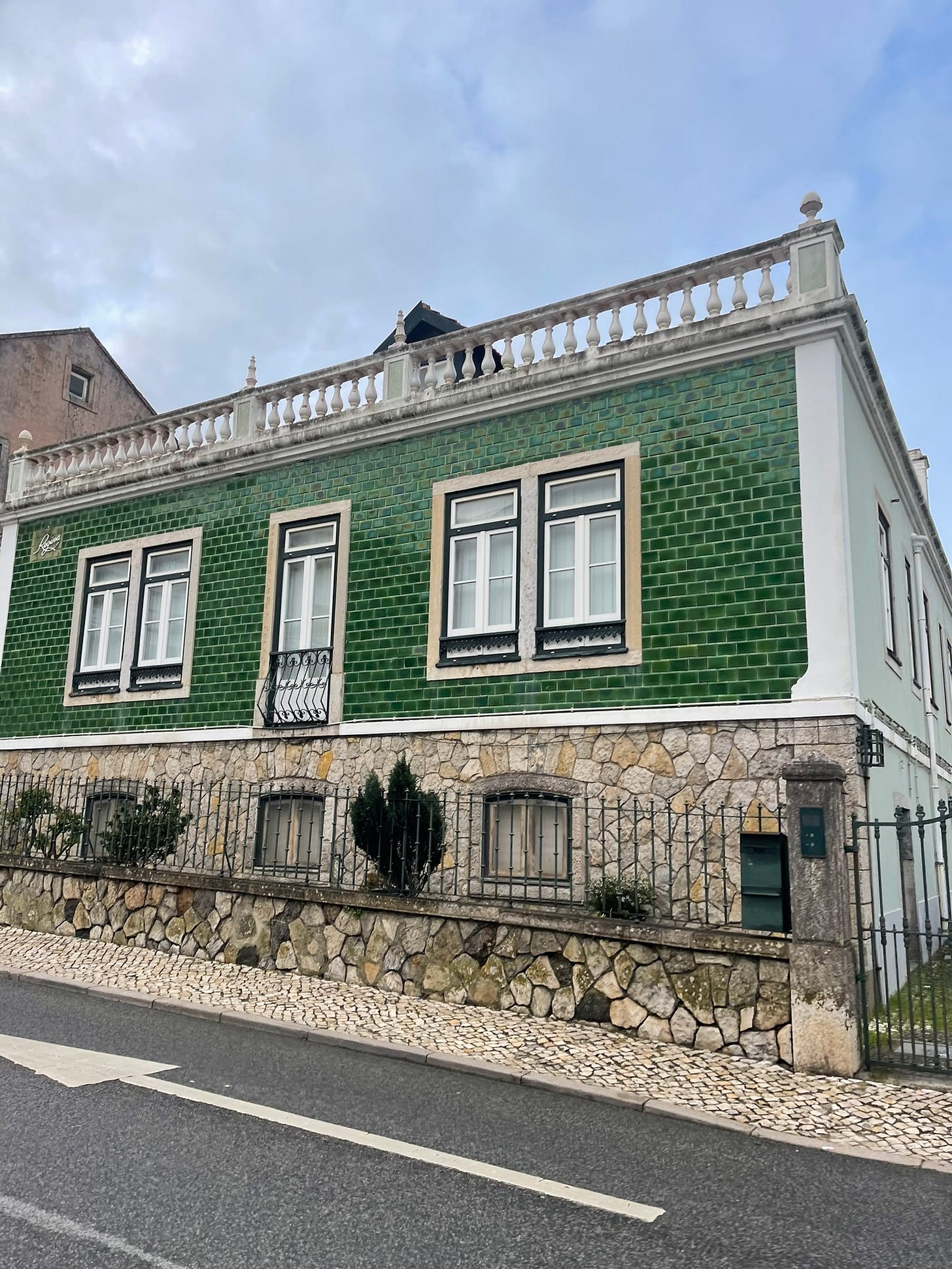
The prevalent backyard trees in the area seem to be the Araucaria and the Stone Pine. The Stone Pine, in Portuguese Pinheiro-Manso, is one of my favorite local trees and I have fond memories of picking up pines from the ground to get pine nuts. Today they are priced like diamonds
The route remains mostly flat. The sidewalks are narrow and there are a lot of crossings but close to zero cars. My early start timing was a good call. The train cuts through the middle of Parede and Carcavelos city centers. It’s only one block away but further down the road we will be able to join the line again. There will be a stark contrast in terrain on the second half of the route. I hope you brought the carabiners in pocket.
Portugal has one, if not the oldest standing land border in the world, we are old - born in 1143. Land has been in families for generations and that is the reason where sometimes properties become abandoned. Large families with inheritances for people of very different ages become tough board meeting deadlocks that are very hard to untangle. Properties, buildings and homes belong to many and to no one. It’s sad, but as someone living through it, it’s very hard to solve.
The train track runs through this otherwise quiet neighborhood. I have never lived this close to the train track, but this being one of the busiest lines to Lisbon, trains start very early and run late at night. I don’t think you need an alarm clock in the houses closer to the line.
The run goes for a 3km long flat straight guarded by trees on both sides of the road, and through the aromatic rail ballast (call me crazy).
I don’t recall this road ever being too busy. We are a few blocks away from Carcavelos city center, a copy paste from Parede, with its own identity. Carcavelos is known in the area for a counterfeit cloths market that takes place every Thursday and on the 2nd Sundays of each month. I don’t know how it goes these days, but this was the place where 40 years ago you could buy your Lacoste, Nike and fake Levi’s. We mocked them as we named it the FIC - Feira International de Carcavelos (International Fair of Carcavelos).
40 years ago, there were a lot of crossings on the train track for pedestrians and cars. I miss those gates and warning signals, even though they were scary. The concrete lobby solved the problem.
Another booming, concrete-business, is student residencies. I applaud the initiative, not the prices. It’s a tough balance to reach. Sell the local education to foreigners making sure that you are not cutting off the locals. In theory this should be a win-win game. Students from different cultures, bring teachers from different cultures and experiences, which enrich and finance better teaching institutions for the locals.
We are closing in the town of Oeiras, a “county” capital, today one of the richest municipalities in the country. Right by the train station is an impressive abandoned foundry building that was once the largest employer in the county.
As Bruce Springsteen once put it - “…Foreman says, “These jobs are going, boys
And they ain't coming back” …” - quotes inside quotes and it compiled! - for my CS friends
As I am arriving at the Oeiras train station, one of the busiest and most important ones, the sky finally gives me a chance for framing a good photo.
We are now halfway through the run and it’s time to get those carabiners out of the pocket. From the Oeiras train station we descend to a narrow valley with a creek. Jardim Municipal de Oeiras. It’s a cozy park that extends all the way to the beach front. We are going inland, under the beautiful metal train bridge.
It’s hard to believe that in the 70s and early 80s this nice looking creek was once an open air sewer fed by the fierce building constructions. Between 74 and 76 Portugal had to host half a million citizens coming from ex-colonies. There was construction galore, little planning and very large gloves.
It’s hard for me to forget about the stench that once emanated from here. Aromas can trigger memories and apparently the reverse is just as powerful.
The park has always been beautiful and is impeccably maintained (the old creek has been replaced by the smell of property tax money).
The park run stretches for approximately 1 km, just enough to fill in the oxygen tanks before the mountain climbing begins. Oeiras town is on hilly terrain and the main street that leads to the city center does the honors.
The climb goes along a narrow one-way street, also with narrow sidewalks. Hard to imagine that this once was a two-way street. I divert to a pedestrian only street that has an interesting decoration. They are bringing the chairs out to the terraces at the coffee shops. Again, perfect timing, they are not open yet, so there shall be no temptation.
Half-way through the climb we arrive at the main square. The main local church and market where in the old days people came for fresh fish and vegetables.
It’s funny on how memory scales things through time. When we were kids this climb was huge, in reality it is not even 1 km. Piece-of-cake.
Oeiras downtown is similar to Parede and Carcavelos. Lots of small shops, bakeries and coffee shops for the locals. We are closer to Lisbon, so during the early 70s and 80s this was the equivalent of the wild west for construction. These apartments, even though of doubtful quality, have become gold mines for their owners and indirectly for the city hall. Only time will fix the mistakes of the past.
I have diverted from the train track to explore the Oeiras city center, but am now reunited with the rails once again. It was a restful downhill to get to the train track leading the way to the Caixas “mountain-range”. It will be another 1km running by the ballast.
At the end of the main road we arrive at the train station of Paço D’Arcos, another small town contiguous to Oeiras - a very busy train station. Fine single-family homes on the left side of the track, high rise buildings on the right side of the track.
It will now be winding road up to Caxias “basecamp” - the next contiguous town - followed by a punishing climb to the top of the hill. Since the area is so hilly I guess it was not as attractive for the high-rise buildings so the landscape becomes more attractive again
I have a surprise waiting for me at the top of the hill, a local guide that kindly photographs my ascent, at a distance, to cover up my suffering semblance.
At the top my local guide, tours me through an interesting backroad.
Caxias hill tops provide some breathtaking views of the ocean. From these hills we can see all the way to Lisbon and Cascais and have glorious sunrises and sunsets.
I am riding the Caxias roller-coaster as from the bottom of the park I choose another climb to get to the very top of Caxias. I am exhausted but I am compensated with a 1km ride down on neutral back to Oeiras.
With money bursting through the pockets, Oeiras, decided to build the most pollutant per capita means of transportation. A 100% concrete monorail that would take people from the train station to the local shopping mall (with a promise to later on expand to important business parks in the region). A Lilliputian pharaonic construction that was a handful of nothing. The single wagon train, “level 5 autonomous driving” kept going back and forth from the station to the shopping mall, empty till obsolescence.
I am sure those concrete pockets were not empty.
Not all the money was wasted in concrete. At the top of yet another hill, there is a magnificent Park of the Poets (well technically they also put a huge 600k concrete obelisk in the middle of the park). Today I have no time or miles left to explore the park, but there are several sports complexes in the area and it is an appealing spot. There is a roof-top dining experience that I highly recommend (not on a too sunny day).
From here the route will be mostly downhill for the next 3km. I am battered by a calf injury from last week that today has been nagging me since the 2nd km. I gladly take the offer of the slide down. I am now running through my teenage neighborhood where the stone pines are now fully grown. Love it.
I take the road all the way down to the heart of Oeiras. Close to the city hall stand the gardens and the Palace of Marquês de Pombal. The blue skies came in at the right time for embellishing the photos. It’s less than a km to go… uphill
During summer time, these gardens regularly host festivities and concerts. There are some Jazz Festivals that bring in well known world artists. These festivals mix gastronomy, art and music and I highly recommend them. They are not too crowded since the space is limited.
On the right we have the Estação Agronomica Nacional. This is a national investigation entity that studies everything related to agriculture. An area that is now dear to me, as I also work in the precision agriculture space.
My final km hurts a little bit. It’s one long stretch of road going uphill along the Estação Agronómica. The road is nice with lots of palm trees on the side walk.
I am happy to arrive at the finish line by a newly built large chain supermarket - signs of progress marching in.
The initial plan was to end by the Oeiras train station to go back to Cascais, but I found out that due to construction trains are not running on Saturday mornings and alternatively there are buses. I booked a ride back with my wife. But first I had to treat myself to my 1st breakfast (yes I would have a 2nd breakfast, I was starving!).
Enjoy your runs!
APF
PS: I enjoy writing these posts but they do take a long time. I will have to spread the writing over the week.

